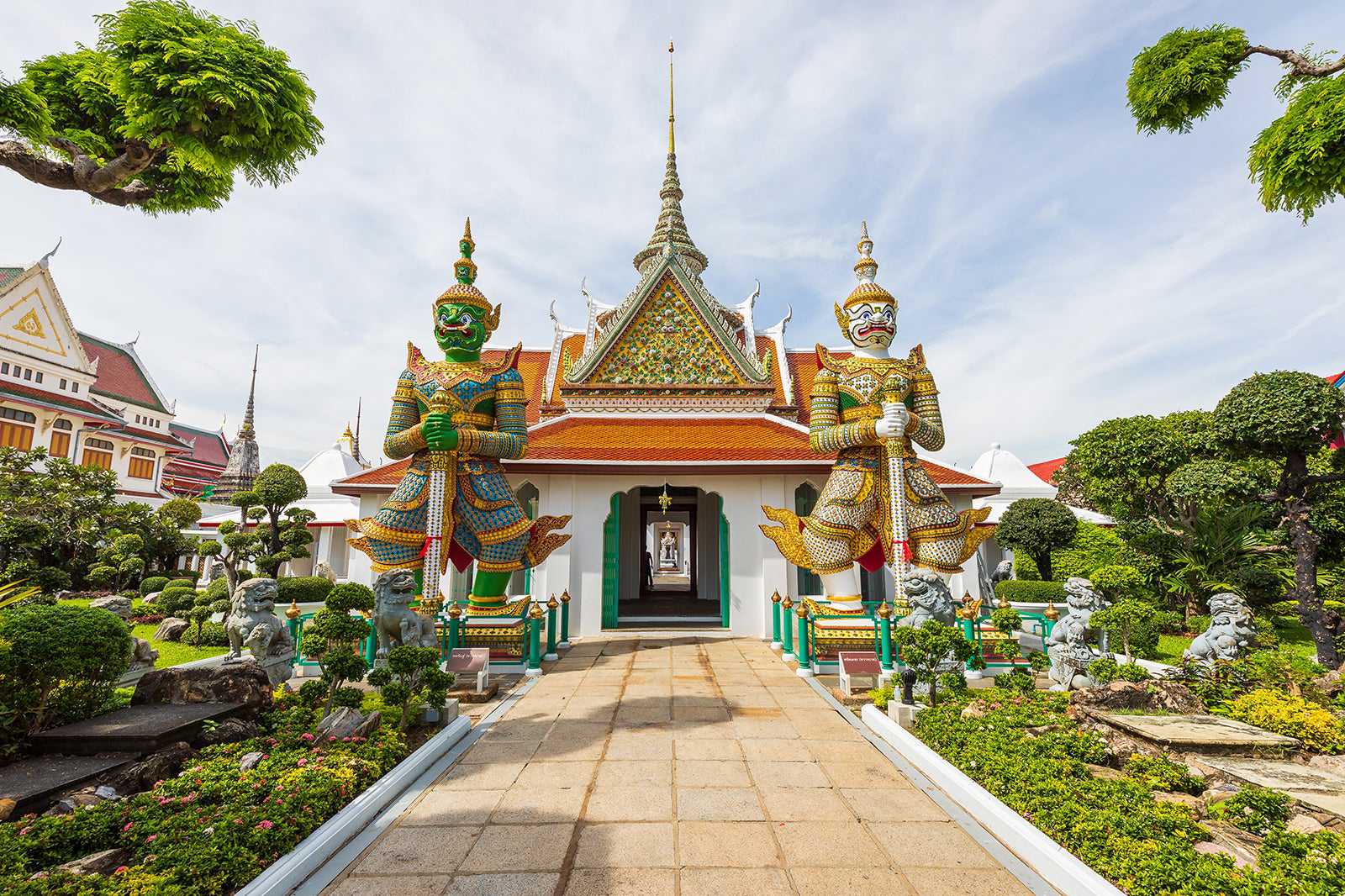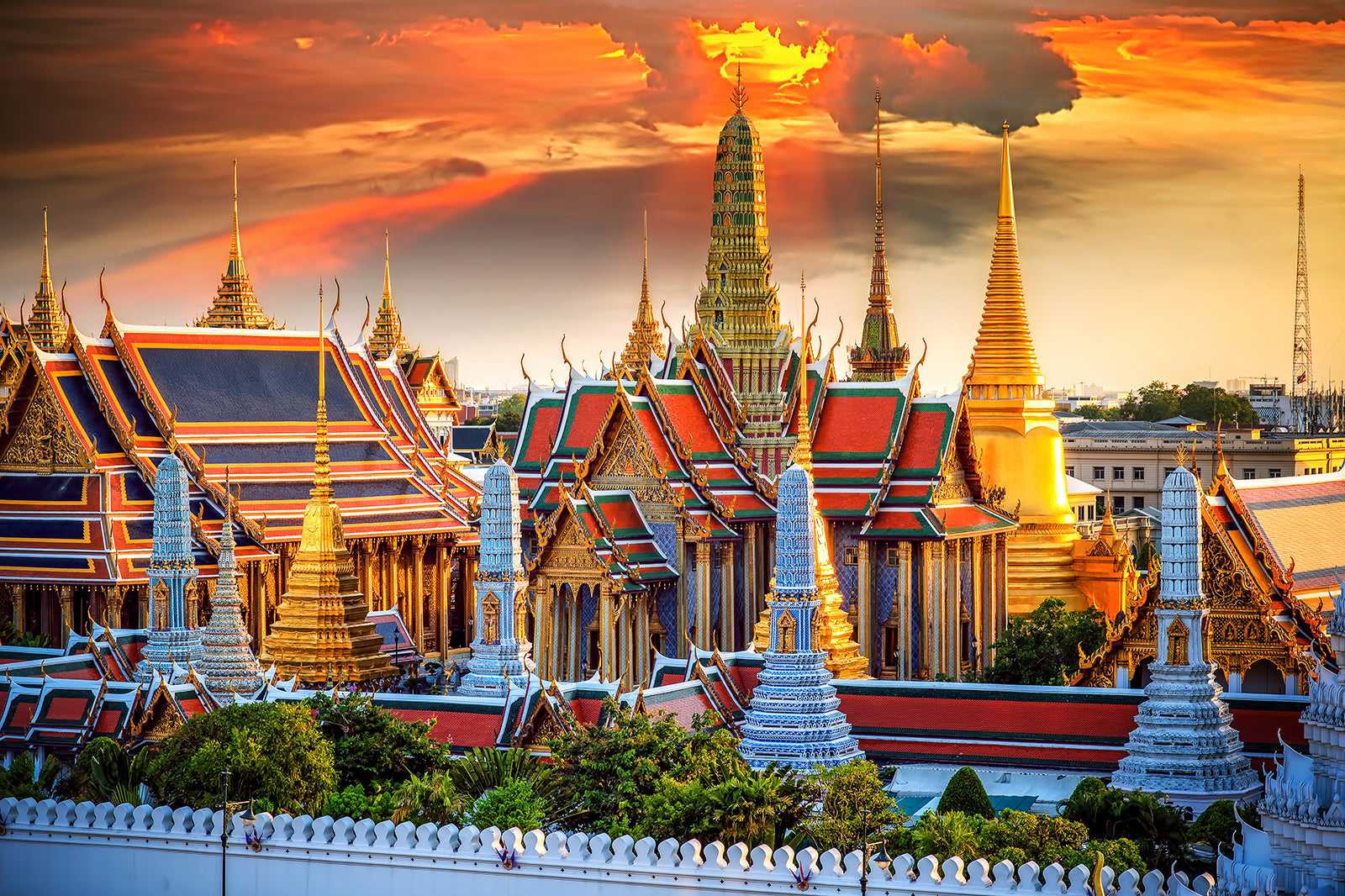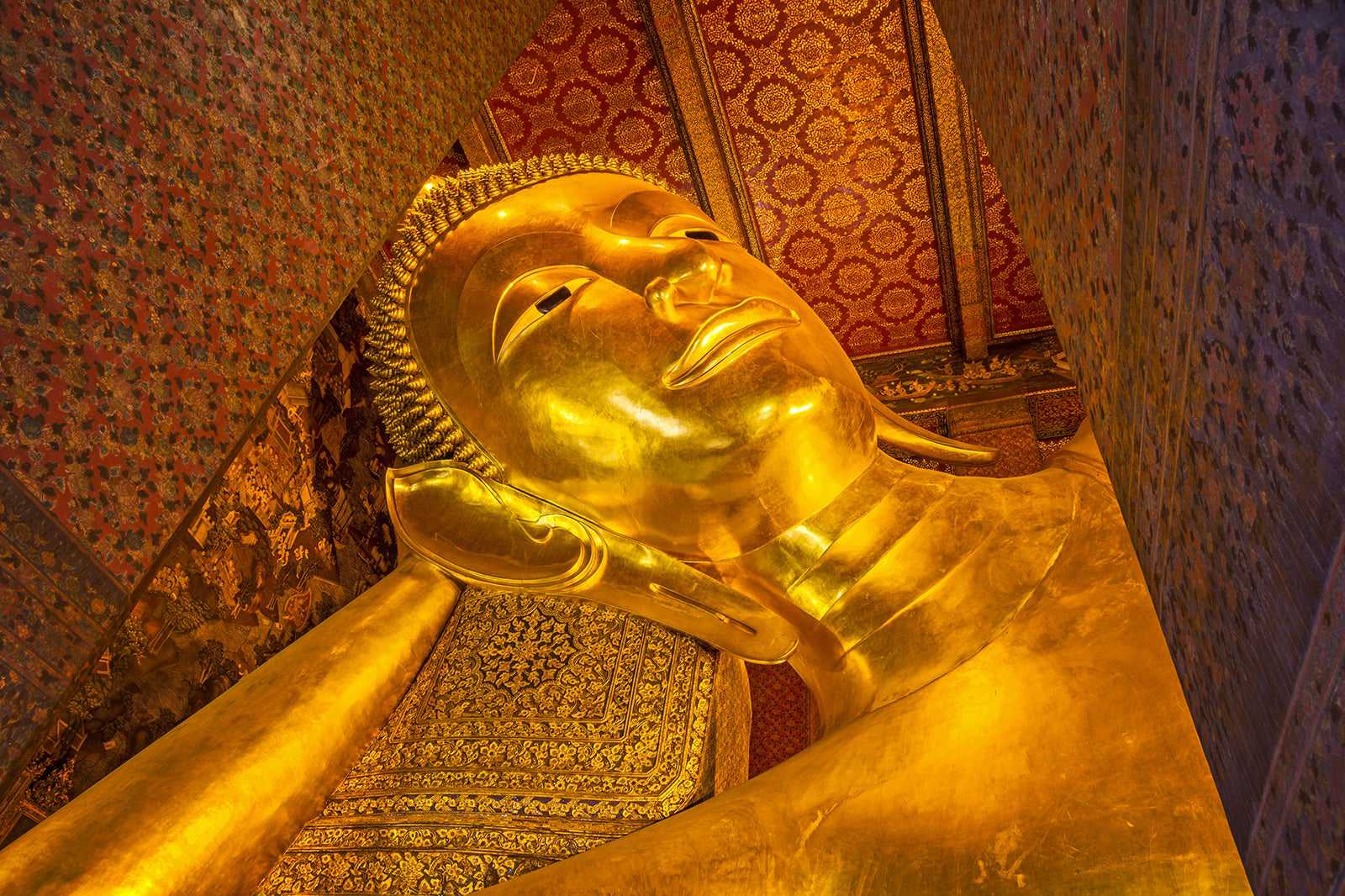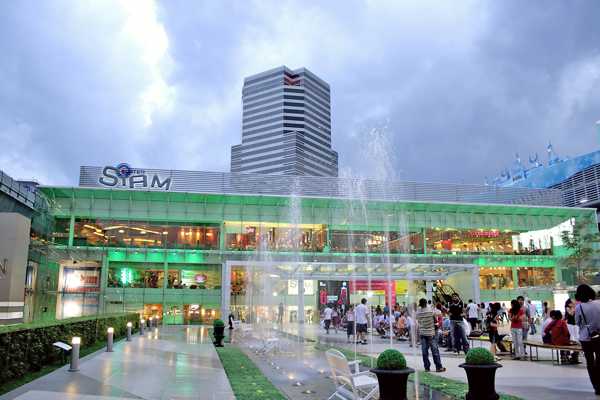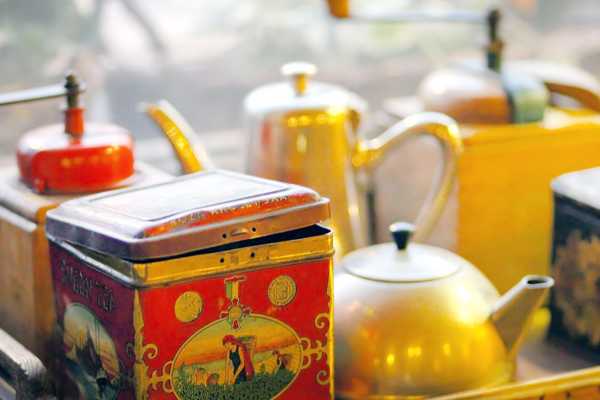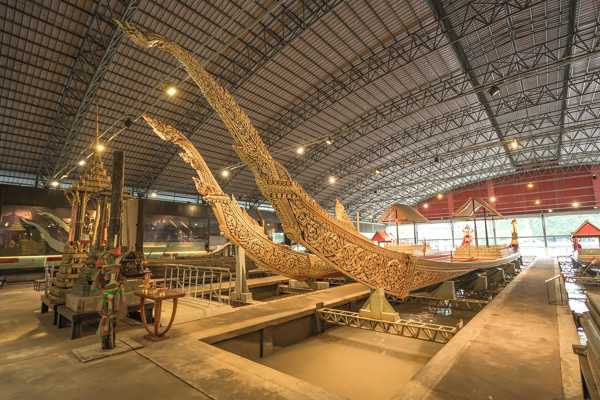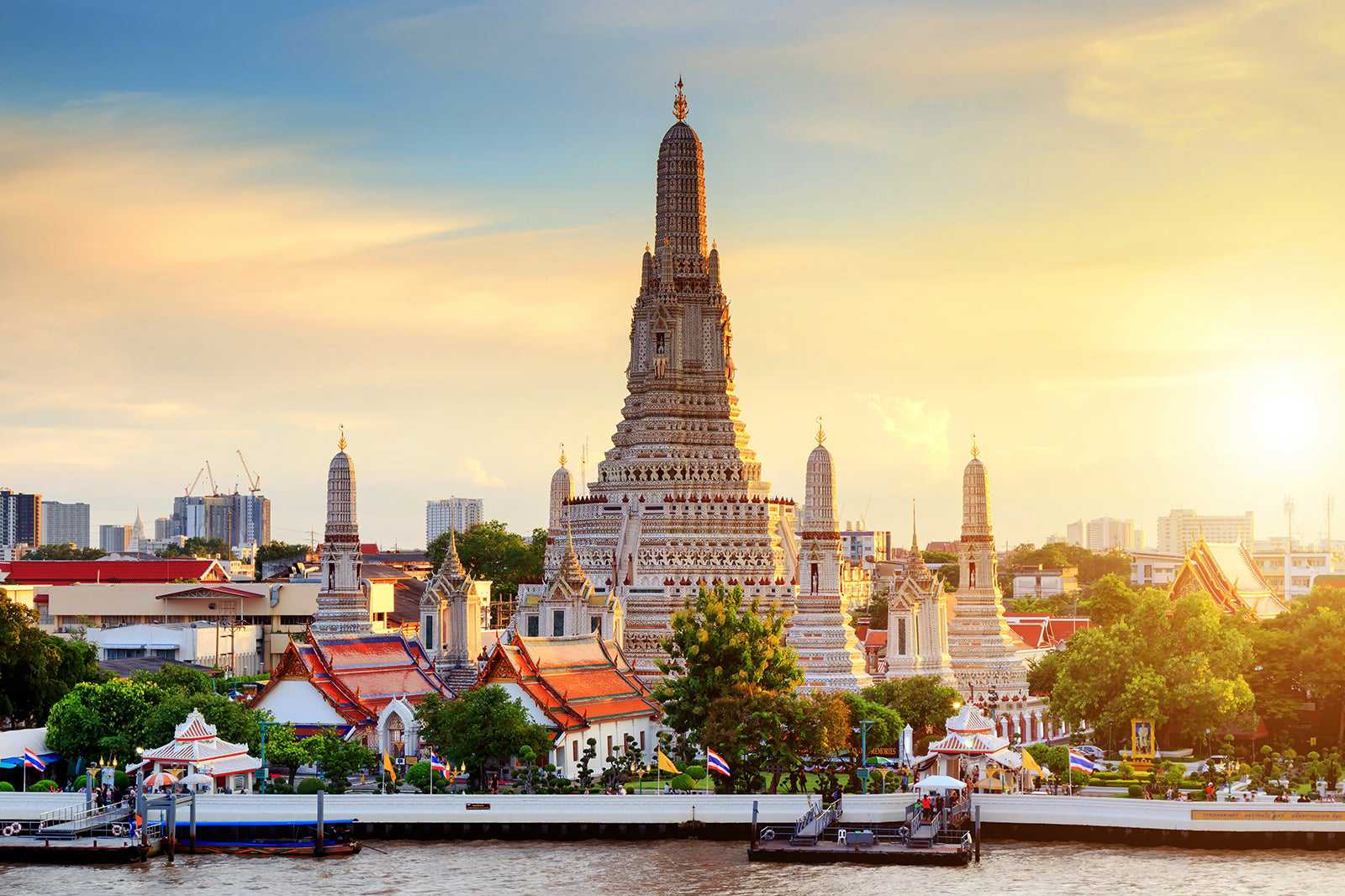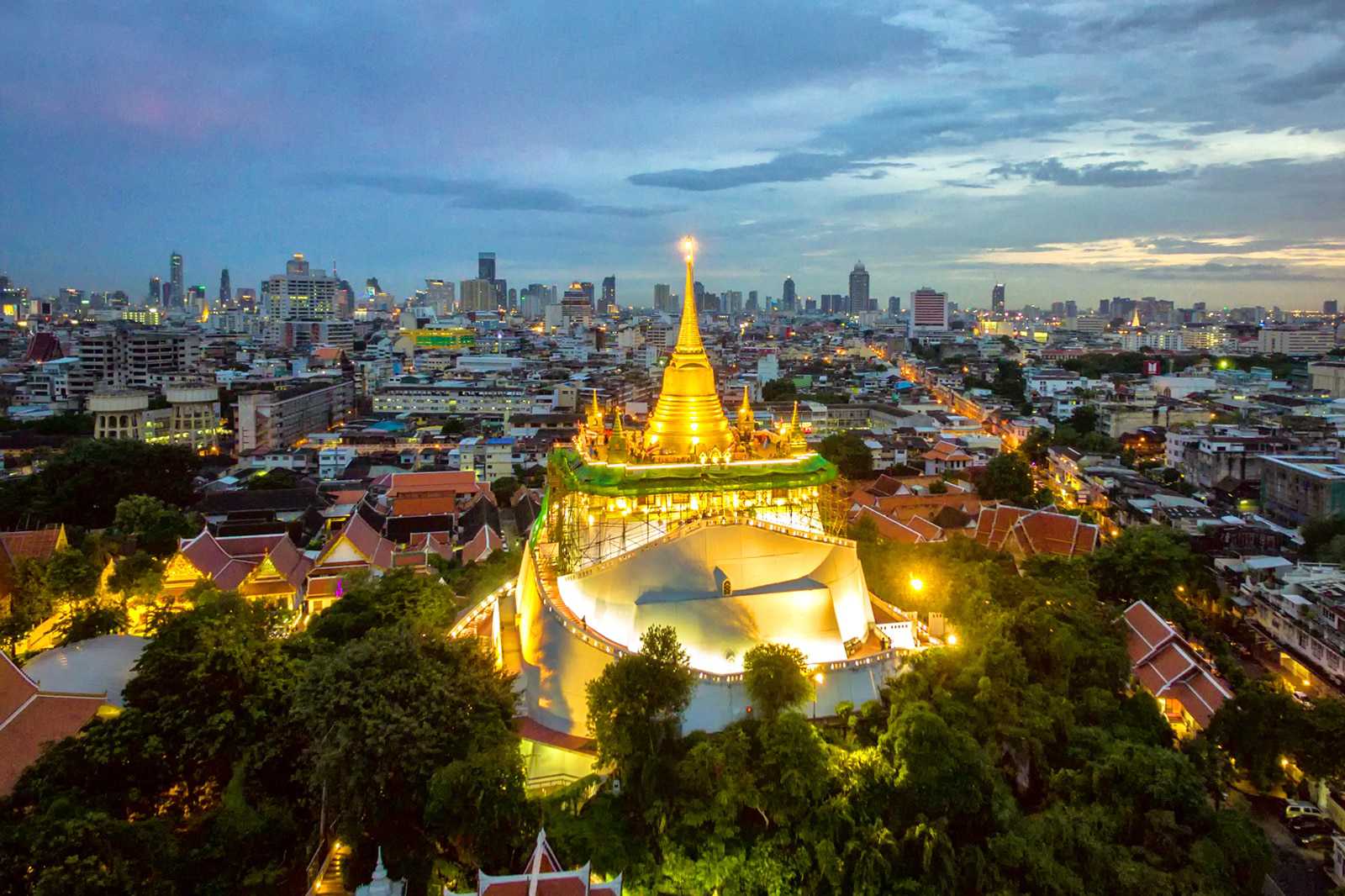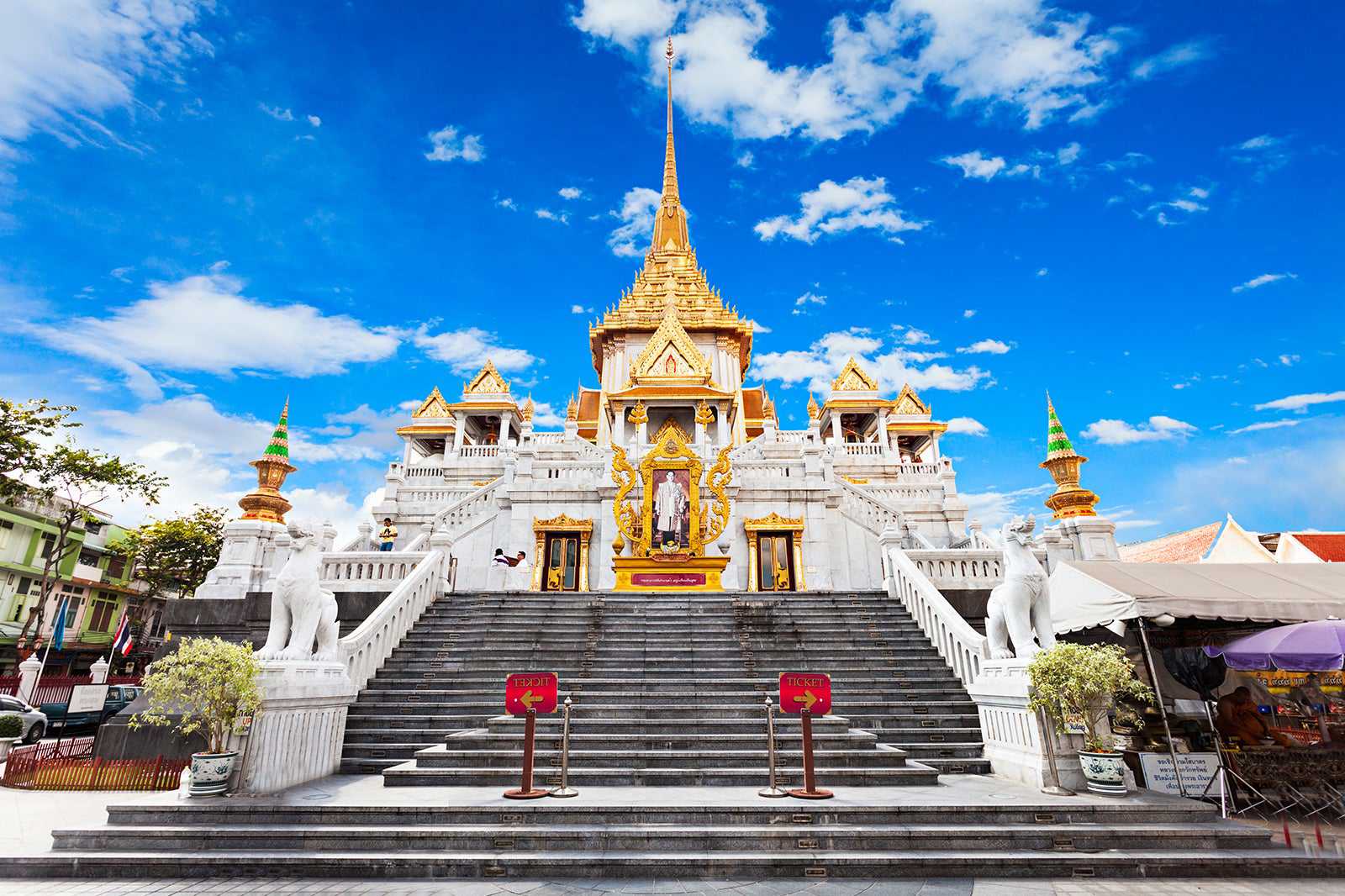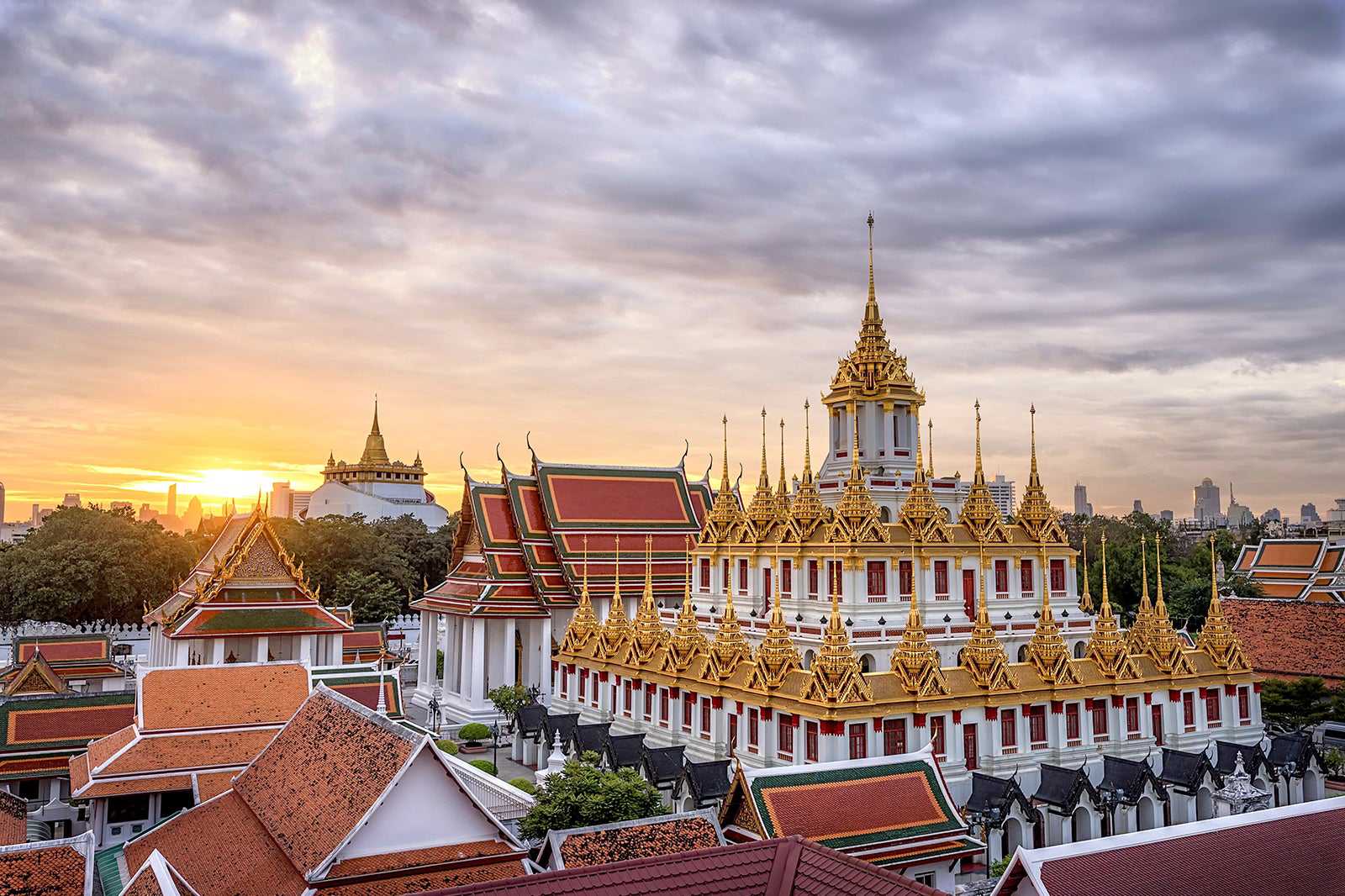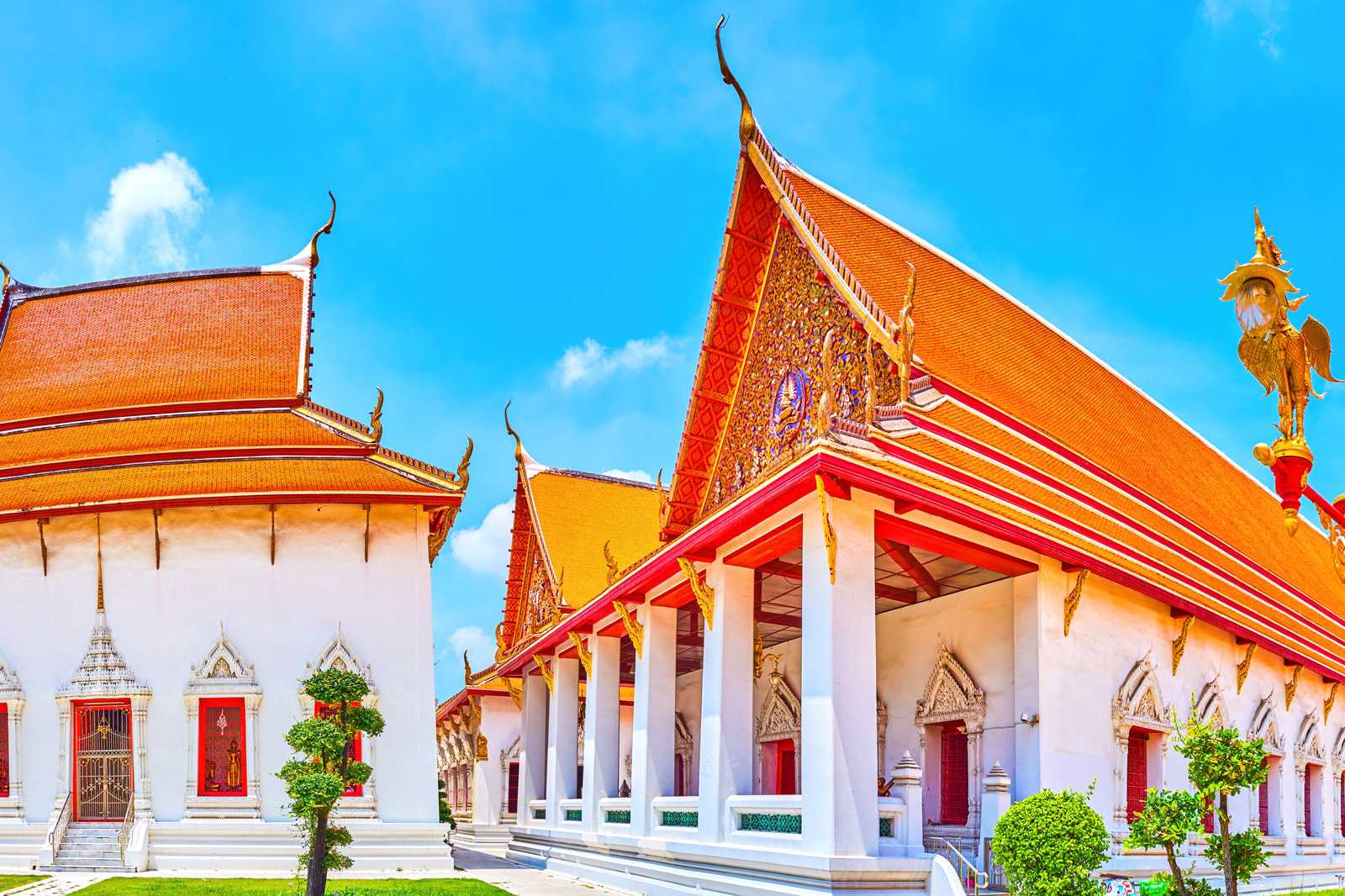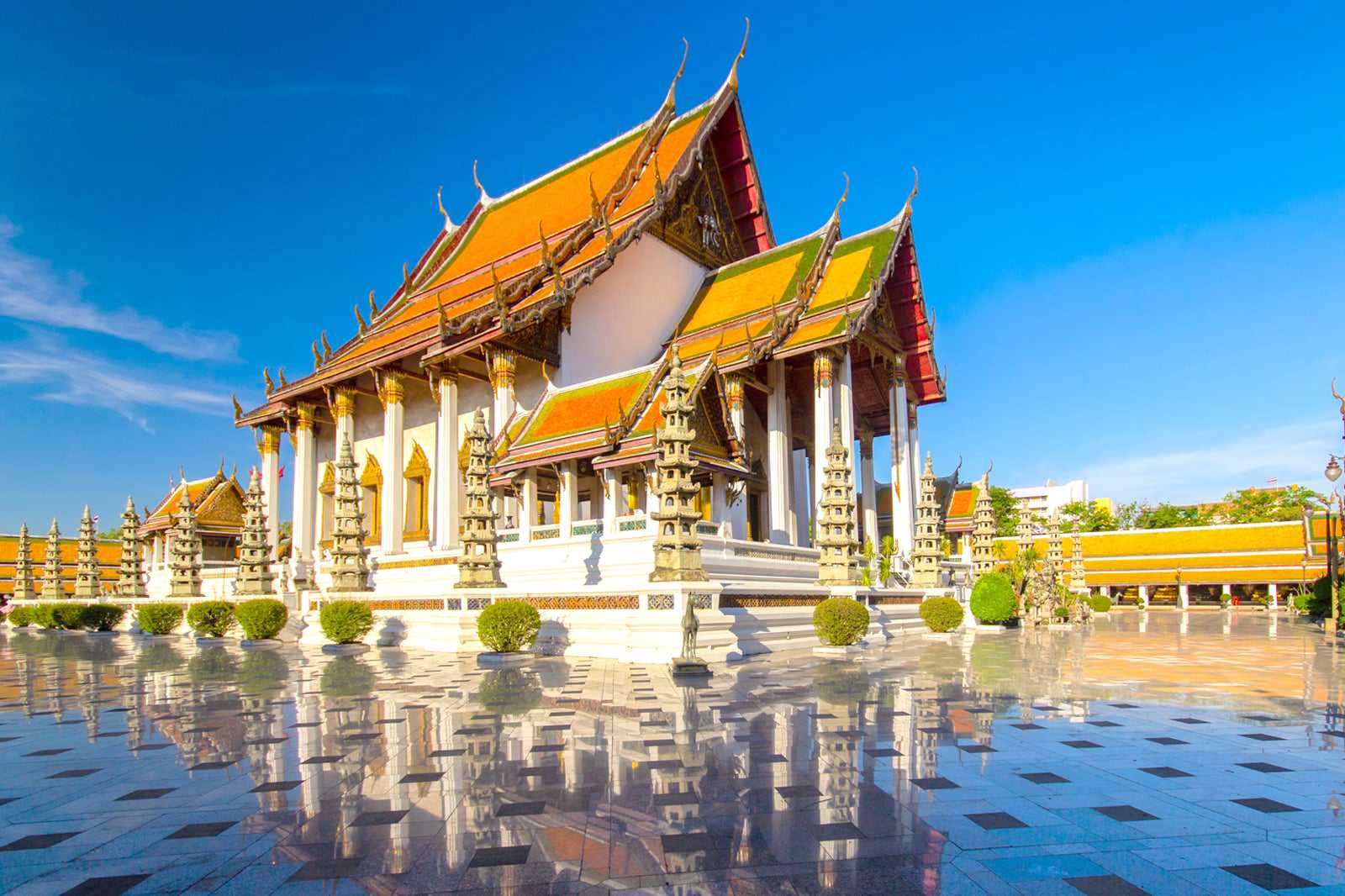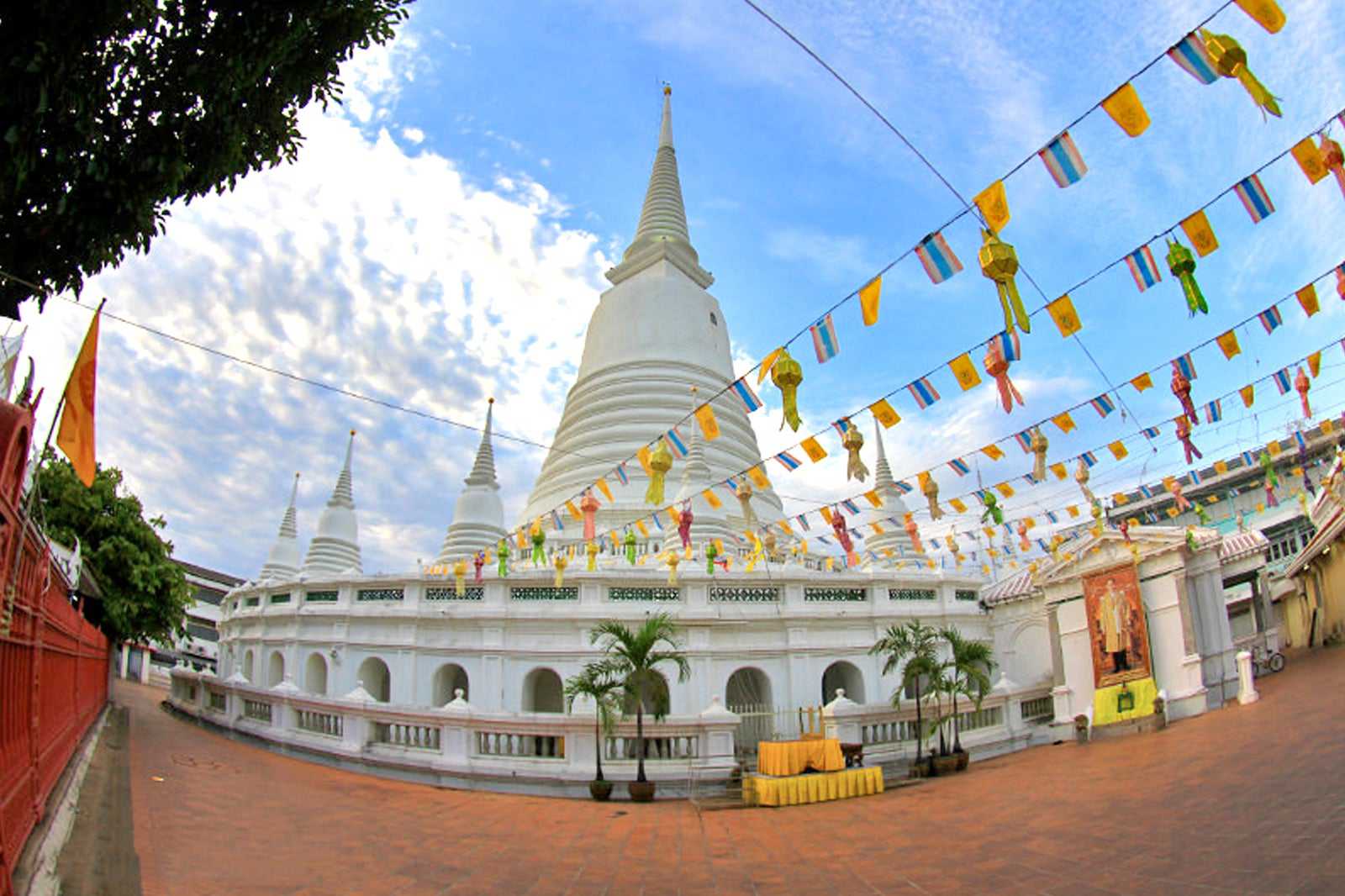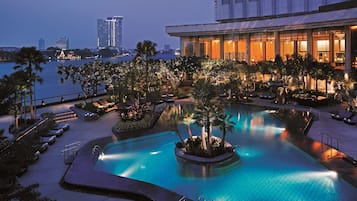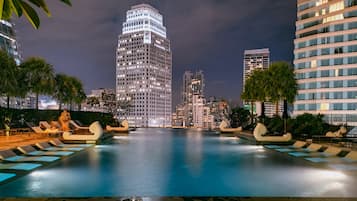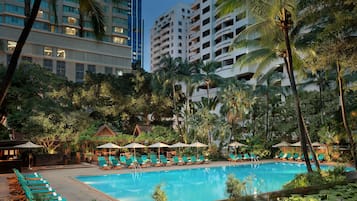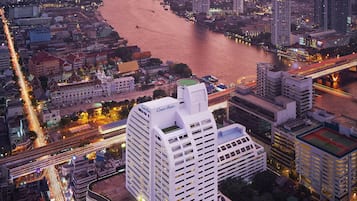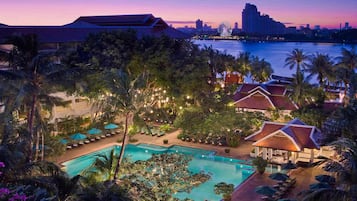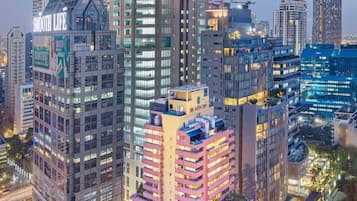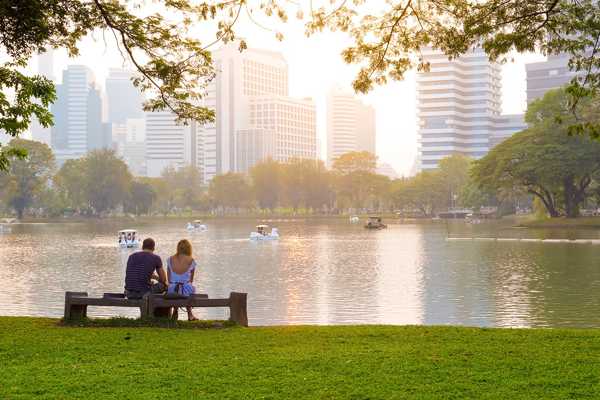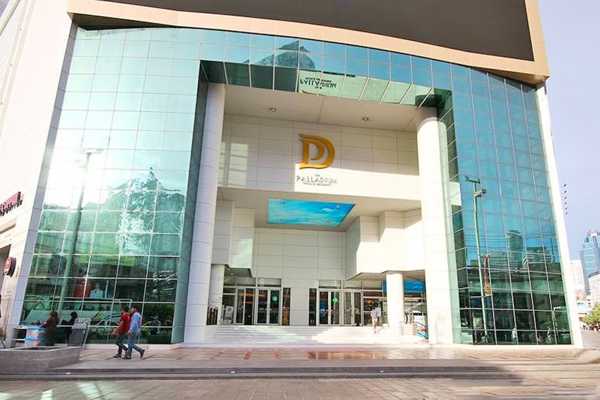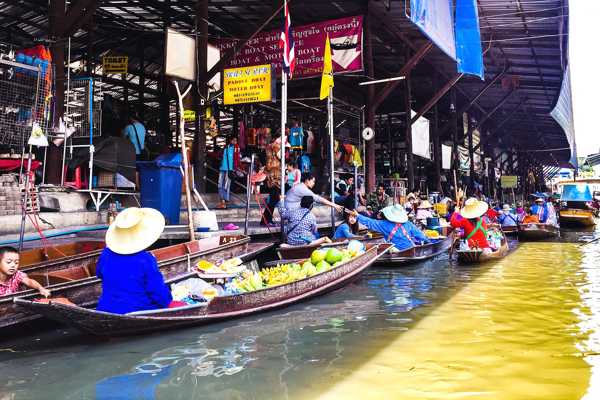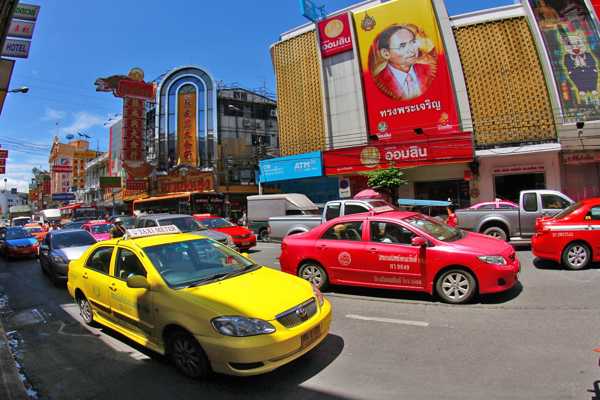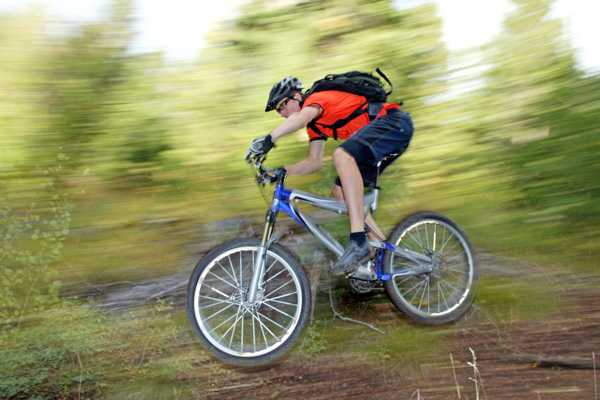Bangkok's temples are a unique part of the capital's heart and soul. A visit here would not be complete without visiting at least a couple of them. The architecture is awe-inspiring and the glittering decoration like no other. Imagine thousands of pieces of coloured glass and pottery adorned with intricate structures gilded in glaring gold – you're indeed in the City of Angels!
The best time to visit most temples is in the early morning. It's cooler and generally less crowded. The temples are not just tourist attractions but also play an important part in Buddhist traditions. Monks live in the temple complexes, wake up around 4am, attend to prayers and duties, and then collect food and necessities from ordinary people on the streets. If you're up very early in Bangkok you will see monks walking around, dressed in saffron-coloured robes. This daily alms ritual (called tak baht) takes place all over Thailand and is part of the Buddhist philosophy of giving and making merit to attain a better life beyond this one.
Thai temples are sacred places so you must dress appropriately. No shorts or revealing tops, otherwise you won't be allowed in. This applies particularly to Wat Phra Kaew inside the Grand Palace.
- 1
Wat Phra Kaew
Temple of Emerald Buddha
- Familier
- Historie
- Billeder
Læs mereBuilt within the grounds of the Grand Palace, Wat Phra Kaew or 'The Temple of the Emerald Buddha' is the most important and most visited temple in Bangkok. One of the most significant features of Wat Phra Kaew is the Emerald Buddha, carved from a 66 cm tall block of jade. This highly revered icon was first discovered in 1464 in Chiang Rai when the wat sheltering it was struck by lightning. It was taken to Laos before coming back to Chiang Mai and finally making a permanent home in Bangkok where you can admire it today.
Wat Phra Kaew is a superb temple to explore, especially the 2-km-long gallery covered with incredibly detailed mural paintings depicting 178 scenes of the epic story of Ramayana. Around every corner you’ll find tall chedis covered with glazed tiles or gold leaf, but the most photographed building is the massive golden chedi of Phra Sri Rattana, featured on the 1 baht coin. The temple is only open until 3.30pm and entrance costs at least 500 baht for non-Thai citizens. A strict dress code applies – no short pants and no sleeveless shirts.
Adresse: Na Phra Lan Rd, Phra Borom Maha Ratchawang, Phra Nakhon, Bangkok 10200, Thailand
Åbningstider: Daily from 8.30 am to 3.30 pm
Telefon: +66 (0)2 224 3290
Kort - 2
Wat Pho
Temple of the Reclining Buddha
- Familier
- Historie
- Billeder
Læs mereWat Pho, named after a monastery in India where Buddha is believed to have lived, is one of the oldest and largest Buddhist temples in Bangkok. Wat Pho is also known as 'The Temple of the Reclining Buddha' thanks to the 15-metre-high, 43-metre-long Buddha image it shelters, covered with gold leaf and baring 4-metre-long feet encrusted with exquisite mother-of-pearl (or nacre) decorations.
Located just next to the Grand Palace, Wat Pho also houses 1,000 Buddha images and 91 chedis (stupas), including 4 very impressive chedis dedicated to the 4 Chakri kings. Wat Pho is also home to the first Thai massage school where Thai massage is taught at the Traditional Medical Practitioners Association Center, located in a shophouse outside the temple. Just in case you have time to learn it, the temple’s full name is Wat Phra Chettuphon Wimon Mangkhlaram Ratchaworamahawihan. The entrance fee is 100 baht.
Adresse: 2 Sanam Chai Rd, Phra Borom Maha Ratchawang, Phra Nakhon, Bangkok 10200, Thailand
Åbningstider: Daily from 8 am to 6.30 pm
Telefon: +66 (0)2 226 0335
Kort - 3
Wat Arun
Temple of the Dawn
- Lavt budget
- Historie
- Billeder
Læs mereWat Arun, the most iconic temple of Bangkok, is located on the Thonburi side of the Chao Phraya River, almost opposite to the Grand Palace and Wat Pho. Built during the 17th century, its full name of 'Wat Arun Ratchawararam Ratchawaramahawihan' is rather hard to remember, so it's often called the 'Temple of the Dawn'. The distinctive shape of Wat Arun consists of a central prang (a Khmer-style tower) surrounded by 4 smaller towers, all encrusted with faience from plates and potteries. The stairs to reach the balcony on the main tower are quite steep, usually easier to climb up than to walk down, but the view from up there is really worth it.
Despite its name, the Temple of Dawn looks amazing at sunset. Wat Arun can be easily accessed via ferry across the Chao Phraya River to Maharaj pier and the entrance fee to the temple is around 50 baht.
Adresse: 158 Thanon Wang Doem, Wat Arun, Bangkok Yai, Bangkok 10600, Thailand
Åbningstider: Daily from 8 am to 5.30 pm
Telefon: +66 (0)2 891 2185
Kort - 4
Wat Saket
The Golden Mount
- Lavt budget
- Familier
- Historie
- Billeder
Læs mereWat Saket is the temple where you can visit the unmistakable golden Chedi of Phu Khao Thong or 'the Golden Mountain'. Built on top of a high hill in the old city of Bangkok, this massive construction has a long and troubled history.
Built first by King Rama III, the first attempt failed and the chedi collapsed because of the soft ground and the construction was abandoned. The golden chedi you see today was built during the reign of King Rama IV and Rama V and is actually built on the remains of the original one. Walk up 300 steps that lead to the top terrace and to the chedi containing a relic of Buddha brought from India.
Adresse: 344 Thanon Chakkraphatdi Phong, Ban Bat, Pom Prap Sattru Phai, Bangkok 10100, Thailand
Åbningstider: Daily from 8 am to 5 pm
Telefon: +66 (0)92 690 9222
Kort - 5
Wat Traimit
The Golden Buddha
- Lavt budget
- Familier
- Historie
- Billeder
Læs mereWat Traimit is an elegant, multilevel, white-and-gold temple located at the very beginning of Yaowarat Road, making it a perfect starting point for a Chinatown exploration. The main attraction of Wat Traimit is not only its beautiful architecture but the immense Buddha made of solid gold seated inside – the largest of this kind in the world.
This 5-metre-high, 5.5-ton statue was long hidden under an unimpressive coating of stucco and plaster thought to have been made in the 13th-14th centuries. The gold hidden underneath was only revealed by accident in 1955! A small entry fee is required to visit the museum located halfway up the steps but, in fact, visiting the golden Buddha above it is free.
Adresse: 661 Charoen Krung Rd, Talat Noi, Samphanthawong, Bangkok 10100, Thailand
Åbningstider: Daily from 8 am to 5 pm
Telefon: +66 (0)89 002 2700
Kort - 6
Loha Prasat
Wat Ratchanatdaram Worawihan
- Historie
- Billeder
Læs mereBangkok has no lack of majestic temples and each is more elegant and impressive than the next, but Loha Prasat really stands out with its unique architectural identity. Also called the 'Metal Castle', Loha Prasat is located on the ground of Wat Ratchanaddaram and was submitted to UNESCO in 2005 to become a World Heritage site, highlighting the historical importance of the temple. Located very near Wat Saket and the Democracy Monument, it's a must-see if you happen to be around Khao San Road.
Adresse: 2 Maha Chai Rd, Wat Bowon Niwet, Phra Nakhon, Bangkok 10200, Thailand
Åbningstider: Daily from 9 am to 5 pm
Telefon: +66 (0)2 224 8807
Kort - Lavt budget
- Historie
- Billeder
Læs mereWat Mahathat (or more precisely Wat Mahathat Yuwarajarangsarit Rajaworamahavihara) was built during the Ayutthaya period. It's one of the 10 royal temples of the highest class in Bangkok, used for royal ceremonies thanks to its strategic location between the Grand Palace and the Royal Palace.
Located within the temple grounds is the oldest higher education institute for Buddhist monks in Thailand and an important centre for the study of Buddhism and meditation. Wat Mahatat has become a popular place to learn Vipassana Meditation, with some classes undertaken in English. Just opposite Wat Mahatat is a gigantic amulet market, which goes far beyond the few vendors on the street walkway.
Adresse: 3 Maha Rat Rd, Phra Borom Maha Ratchawang, Phra Nakhon, Bangkok 10200, Thailand
Åbningstider: Daily from 7 am to 5 pm
Telefon: +66 (0)2 222 6011
Kort- Familier
- Historie
- Billeder
Læs mereWat Suthat, better known for the red Giant Swing that stands at its entrance, is one of the oldest and most impressive temples in Bangkok. It features an elegant chapel with a sweeping roof, magnificent wall murals and exquisite hand-carved teakwood door panels.
The temple’s construction was commissioned by King Rama I (1782-1809), to shelter the 13th-century bronze Buddha image transported by boat from Sukhothai, but it was finally completed during King Rama III’s reign (1824-51). Located in the Old City area, just east of the Royal Field, you can easily combine a visit to Wat Suthat with the Temple of the Emerald Buddha, the Grand Palace and Wat Pho.
Adresse: 146 Bamrung Mueang Rd, Wat Ratchabophit, Phra Nakhon, Bangkok 10200, Thailand
Åbningstider: Daily from 8.30 am to 9 pm
Telefon: +66 (0)2 622 2819
Kort- Lavt budget
- Familier
- Historie
- Billeder
Læs mereWat Prayoon, or Wat Rua Lek, sits on the western side of the Chao Praya River. Built during King Rama III’s reign, the temple’s outstanding features include a large inverted bell-shaped chedi (pagoda), turtle mountain housing spirit houses, and a pond where visitors can feed the turtles.
The temple is located on the Thonburi side of the river, at the foot of Memorial Bridge (Saphan Phut). This area is on the southern edge of the old Portuguese community (Kuthi Jeen), an area designated to Portuguese merchants and government officials during the Early Rattanakosin Period (after Ayutthaya was destroyed and King Rama I founded a new capital in Thonburi).
Adresse: 24 Prajadhipok Rd, Wat Kanlaya, Thon Buri, Bangkok 10600, Thailand
Åbningstider: Daily from 8 am to 5.30 pm
Telefon: +66 (0)2 466 1693
Kort- 10
Wat Benjamabhopit
The Marble Temple
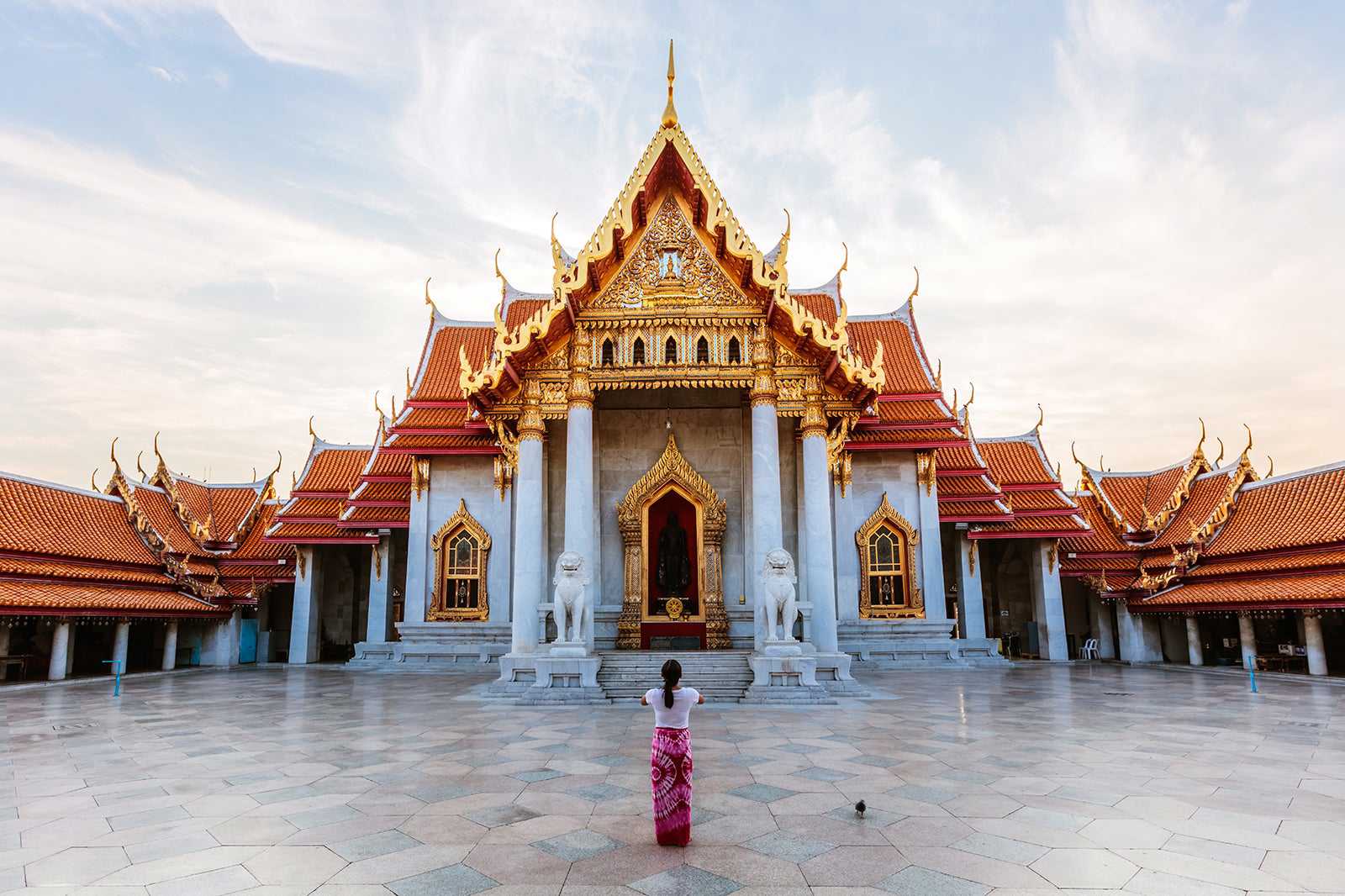
- Lavt budget
- Familier
- Historie
- Billeder
Wat Benjamabhopit, most commonly called Wat Benja, was built by King Rama V in 1900 and is renowned for more than one reason. It's nicknamed 'The Marble Temple' because all the external walls of the main temple are covered with marble imported from Italy but is more famous for being the temple embossed on the back of 5 baht coins. Located near the many government offices and palaces, this wat is highly revered and is often visited by high-ranked officials.
Adresse: Rama V Road, 5 Dusit, Dusit District, Bangkok 10300, Thailand
Åbningstider: Daily from 8 am to 5.30 pm
Kort - 11
Wat Pathum Wanaram
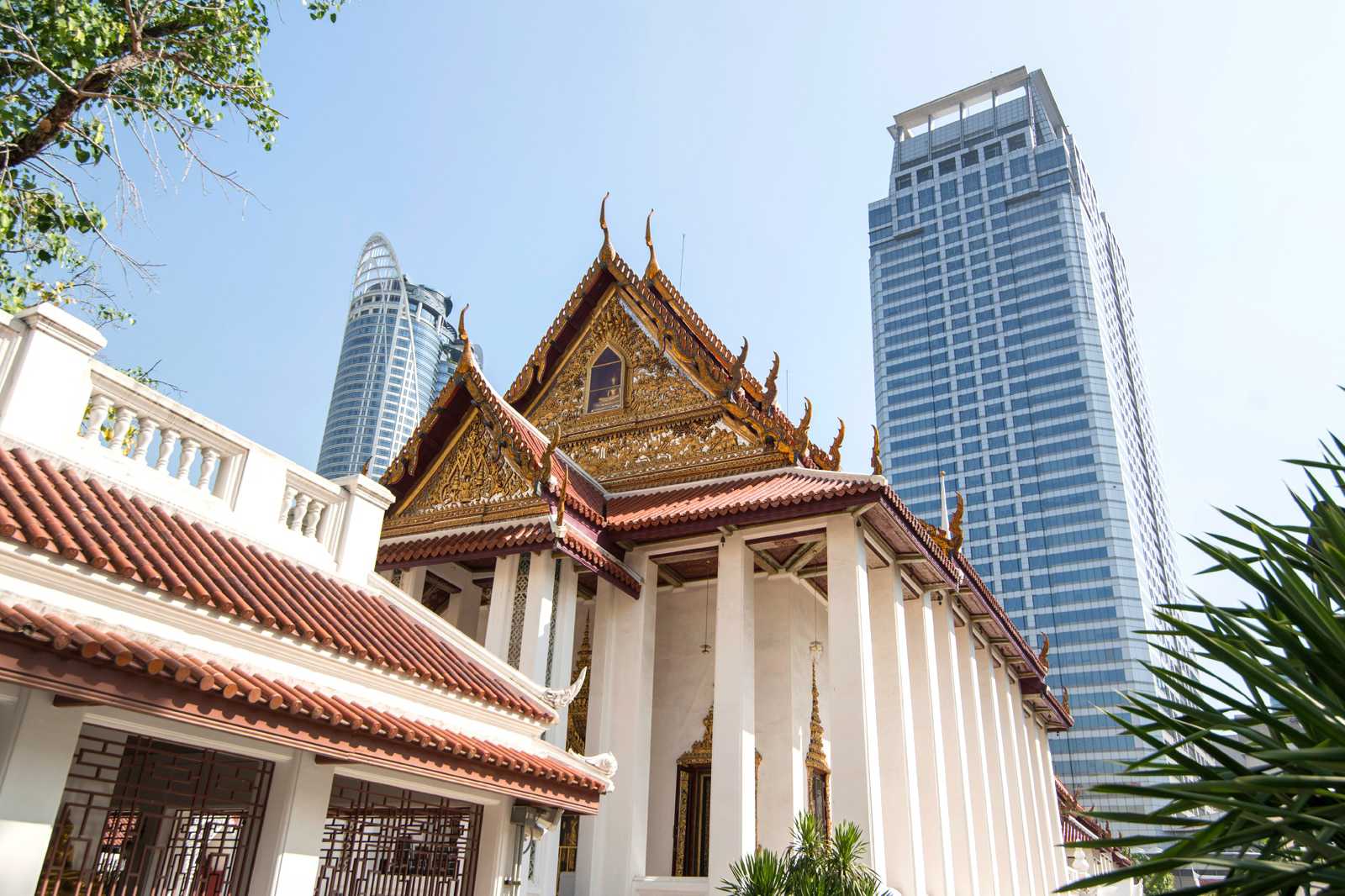
- Historie
- Billeder
At the time of founding, this area was accessible only by khlong (canal) and was still surrounded by rice fields. Built by King Mongkut in 1857, Wat Pathum Wanaram was the nearest place of worship to his Sa Pathum Palace.
Take a look at the carvings on the crematorium that demonstrate rare examples of ancient craftsmanship, featuring ornate stencils and lacquered sculptures. Pathum Wanaram is the perfect escape for some cultural refreshment after shopping in nearby Siam Paragon or CentralWorld.
Adresse: 969 Rama I Rd, Pathum Wan, Pathum Wan District, Bangkok 10330, Thailand
Åbningstider: Daily from 9 am to 5 pm
Telefon: +66 (0)2 251 6469
Kort - 12
Wat Bowon Niwet
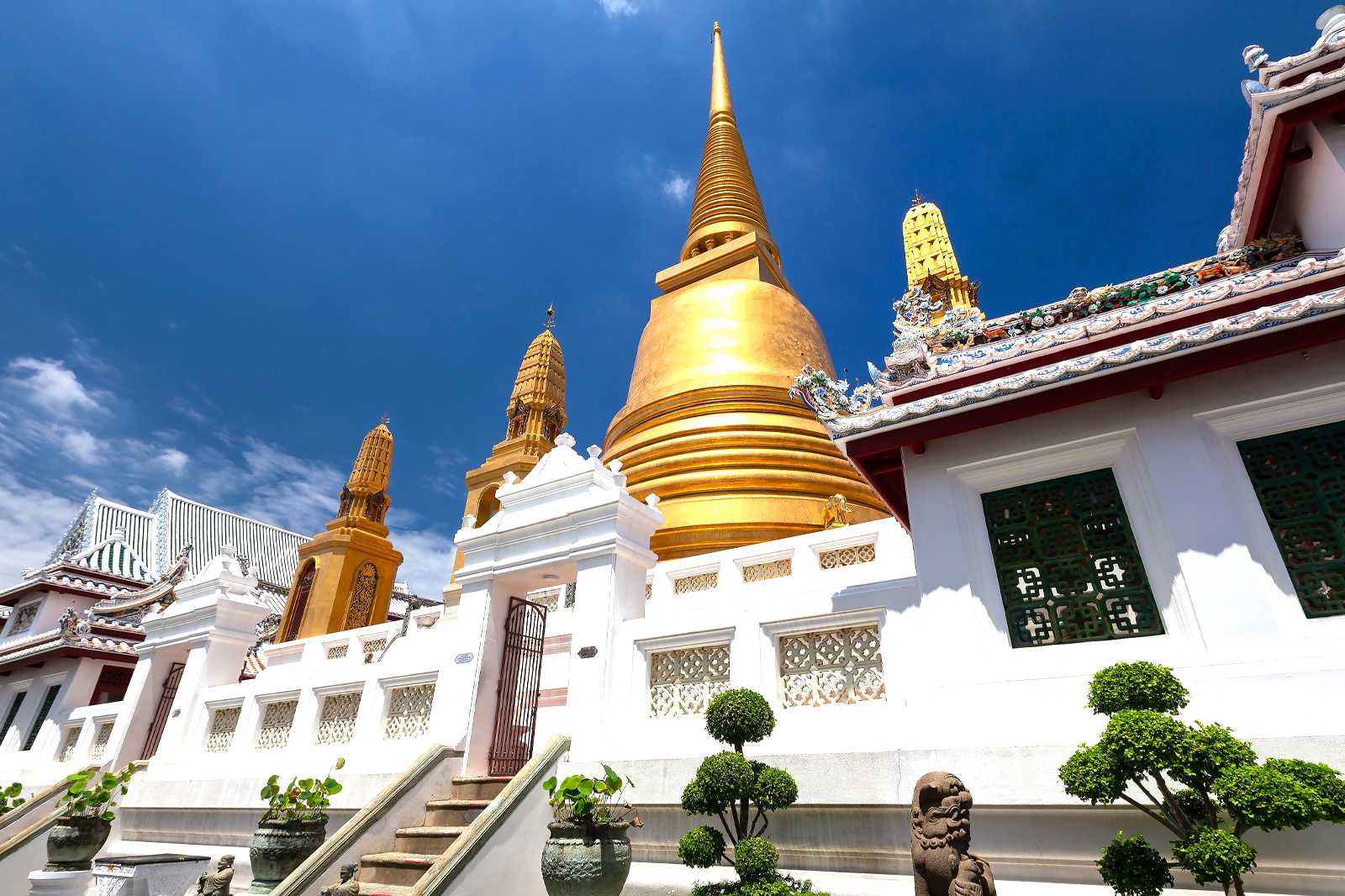
- Lavt budget
- Familier
- Historie
- Billeder
On top of the obvious religious significance, Wat Bowon Niwet has added sacredness due to its long-standing connections with the Thai royal court, making it especially important for Thais. Located on Bangkok's Rattanakosin Island, just within the old city walls on Phra Sumen Road, it was founded in 1826 by HRH Prince Maha Sakdipolsep, a son of King Rama III. The complex consists of elaborately carved doorway arches and windows in gilded stucco. The gable is decorated with glazed ceramics, indicating strong Chinese architectural influences. There are several rare and much revered Buddha statues, a large chedi covered in gold tiles, surrounded by 4 small golden prangs (Khmer-style towers).
Its regal history dates back to the first abbot in 1836. This was none other than Prince Bhikku Mongkut, who later acceded the throne to become King Rama IV. Before this, he spent 27 years in the priesthood and 14 as abbot of Wat Bowon, founding Thailand's second Buddhist university, Mahamakut University, within the temple grounds. King Rama VI, King Rama VII and HM King Bhumibol Adulyadej were also ordained here, making this a major temple of patronage for the Chakri Dynasty.
Adresse: 248 Phra Sumen Rd, Wat Bowon Niwet, Phra Nakhon, Bangkok 10200, Thailand
Åbningstider: Daily from 8 am to 5 pm
Telefon: +66 (0)2 629 5854
Kort - 13
Wat Chana Songkhram
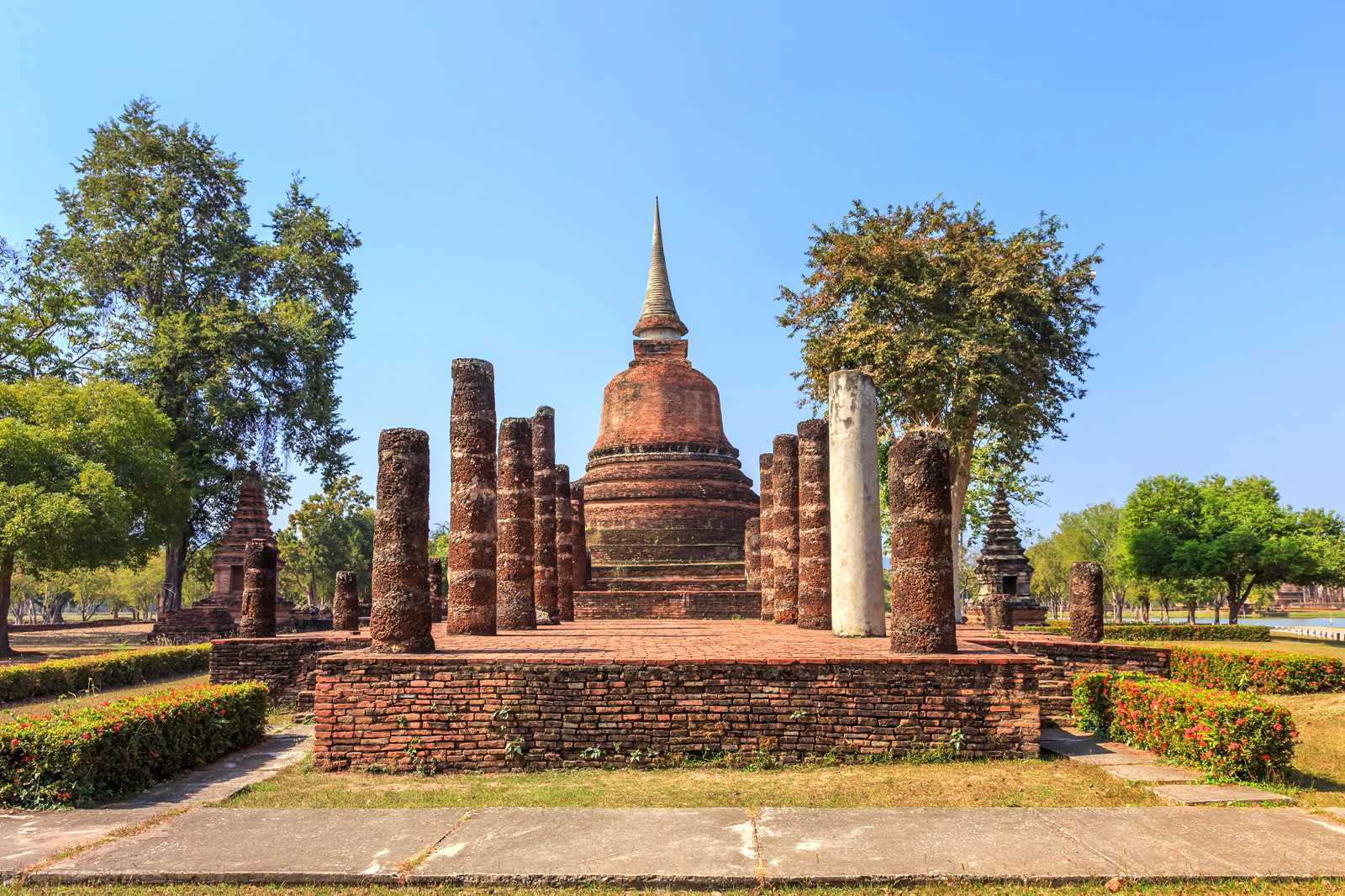
- Lavt budget
- Historie
- Billeder
Proof that the sacred can survive amid the profane is Wat Chana Songkhram. Its location in the backpacker enclave Banglamphu, close to Khao San Road and the mildly less frenetic Soi Rambuttri, belies both the ancient heritage and the tranquillity of this small temple.
Its origins date back to the Ayutthaya period, but it was restored in 1787, during the reign of King Rama I. This was after the famous victory in the Nine Armies' Wars, which explains the name – Wat Chana Songkhram Ratchaworawihan translates as 'victory in war'.
Adresse: Chakrabongse Rd, Chana Songkhram, Phra Nakhon, Bangkok 10200, Thailand
Åbningstider: Daily from 8 am to 5 pm
Telefon: +66 (0)2 281 9396
Kort - 14
Wat Intharawihan
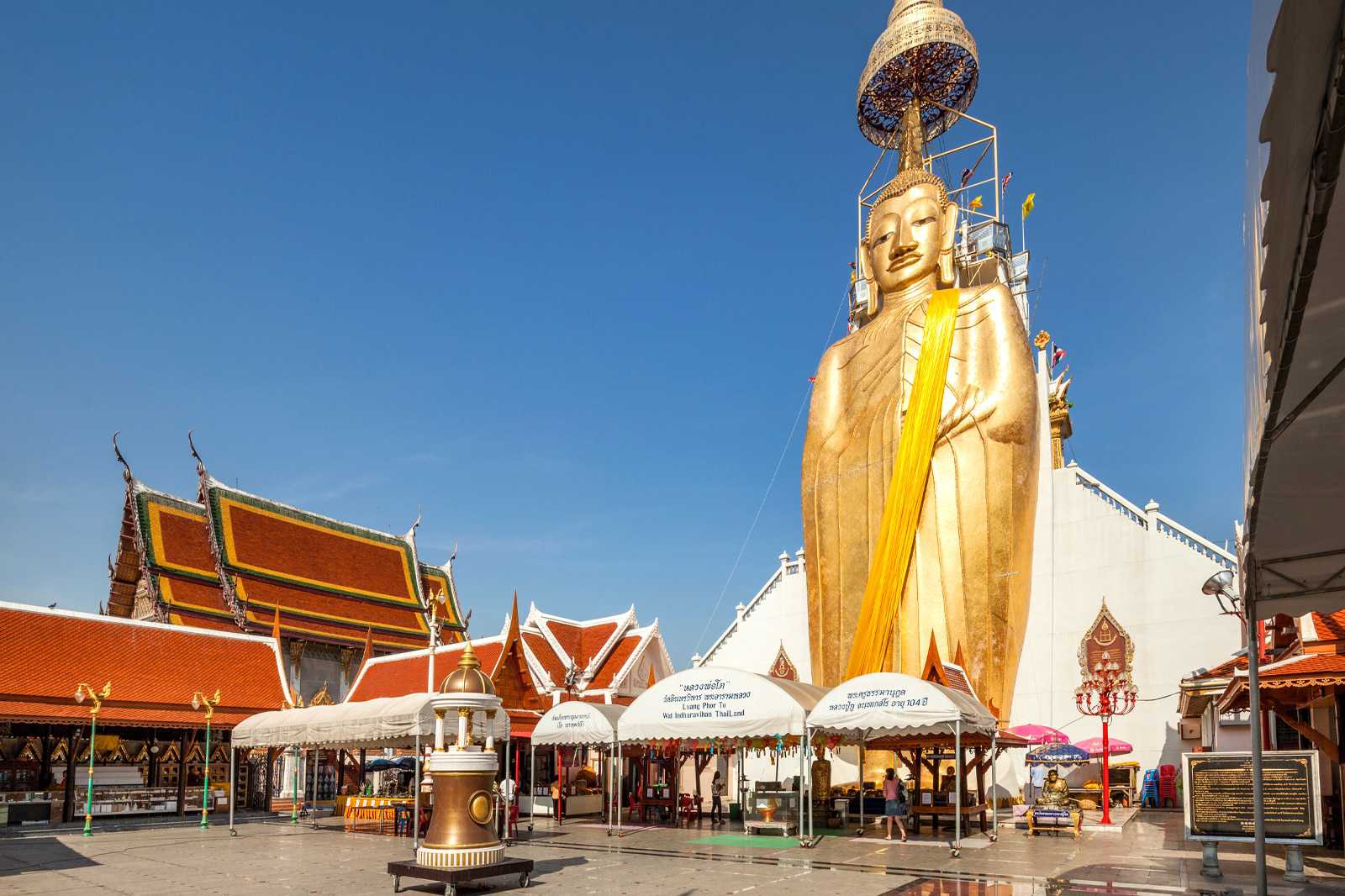
- Lavt budget
- Historie
- Billeder
A soaring, 32-metre-high standing Buddha is what defines Wat Intharawihan, which borders Wisut Kasat Road at the northern edge of Banglamphu. Known as the Luangpor Toh, the building of this statue began in 1867, during the reign of King Rama IV. Decorated in glass mosaics and 24-carat gold, it took over 60 years to complete.
The prayer room was built towards the end of the Ayutthaya period and has several interesting Buddha images, elevated murals on the walls and lavishly gilded window shutters. Outside are unusually carved stones and, tucked away in an alcove, there's a lifelike model of Luang Phaw Toh, a famous monk. In the small museum are old Buddha images and various paintings.
Adresse: 114 Wisut Kasat Road, Banglamphu, Phra Nakhon, Bangkok 10200, Thailand
Åbningstider: Daily from 6 am to 6 pm
Telefon: +66 (0)2 282 3173
Kort - 15
Wat Kalayanamit
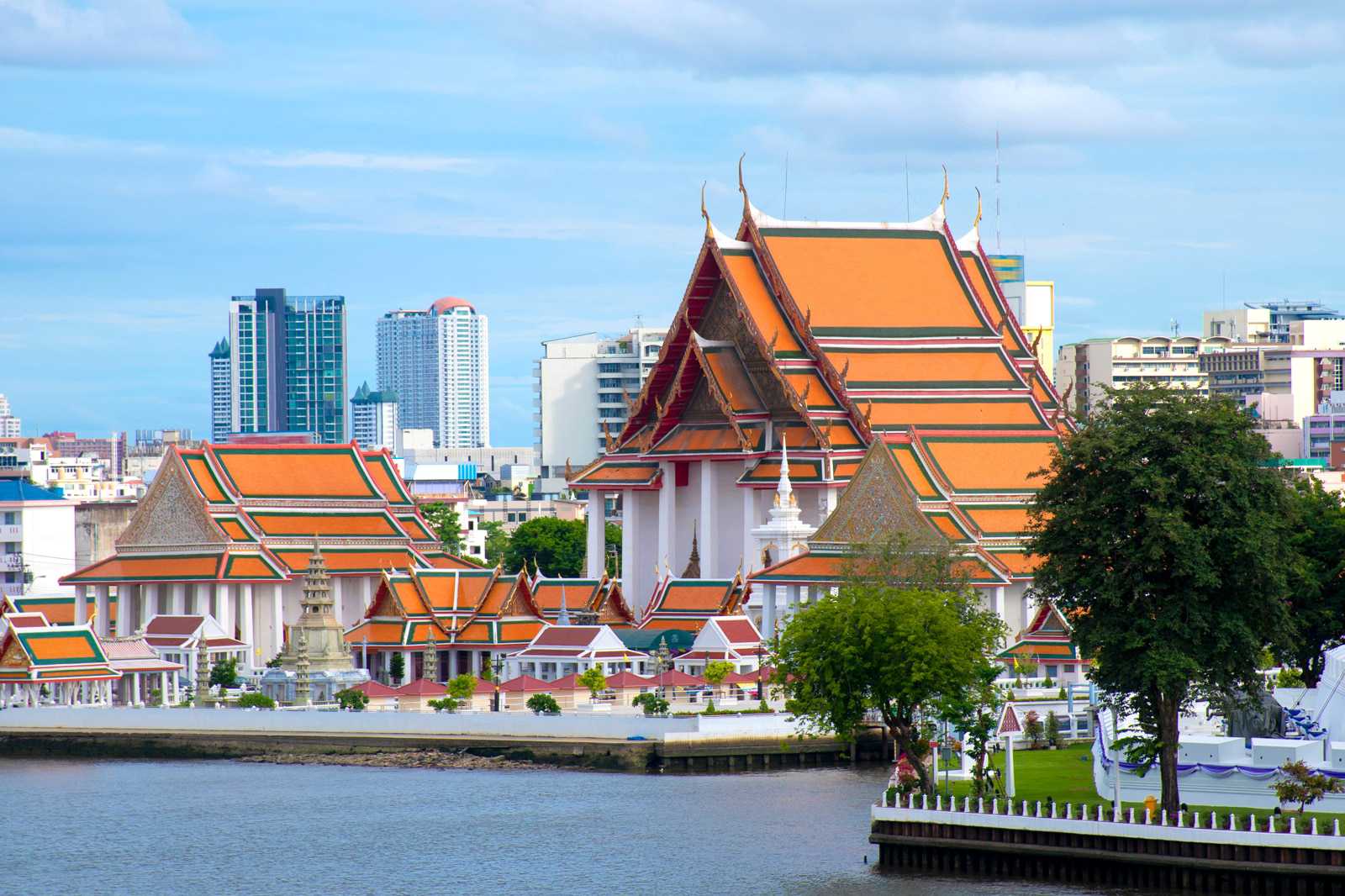
- Lavt budget
- Historie
Despite dominating the western bank of the Chao Phraya River with its giant temple structure, Wat Kalayanamit is often overlooked by tourists, city guides, and even locals. The nearby Wat Arun is much more famous and acts as a magnet, drawing the crowds away from some of the other nearby Thonburi attractions and temples. If you want a more tranquil, less touristy alternative, head to Wat Kalayanamit, a temple particularly famous for its enormous golden seated Buddha inside the main building.
Getting to Wat Kalayanamit in Thonburi is easy. In fact, it even has its own pier. Take a ferry there from the opposite side at Ratchinee Pier or hop on one of the many the Chao Phraya express boats that make their way up and down the river every day and ask for "Wat Kalaya-namit".
Adresse: New Arun Amarin Rd, Wat Kanlaya, Thon Buri, Bangkok 10600, Thailand
Åbningstider: Daily from 8 am to 5 pm
Kort - 16
Wat Rakhang Khositaram
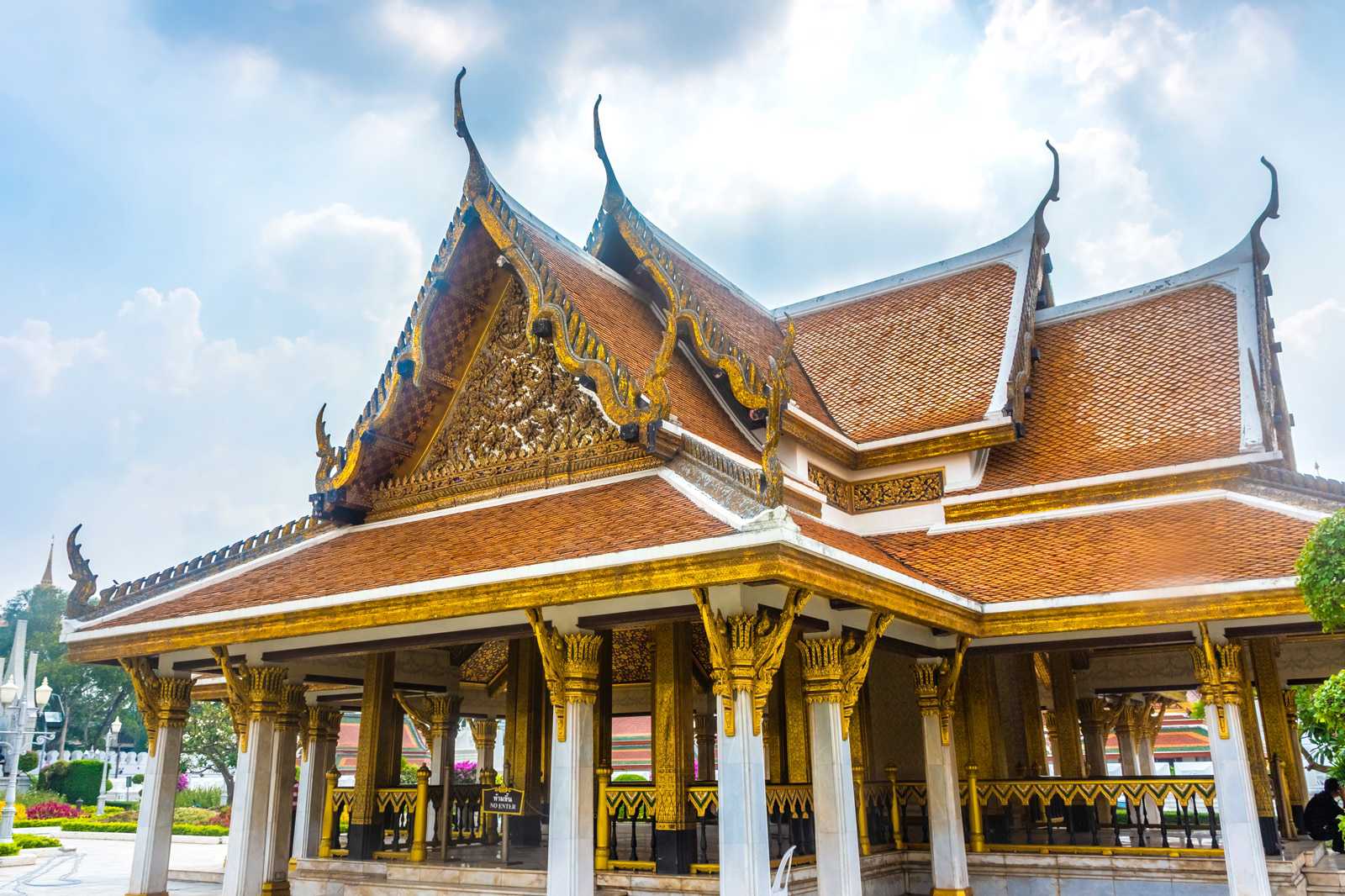
- Lavt budget
- Historie
- Billeder
An ancient temple located in Thonburi, next to the Chao Phraya River, Wat Rakhang Khositaram was originally built in the Ayutthaya period. It earned its name – meaning 'temple bell' – during the reign of King Rama I when a bell was found in the temple compound. Later, King Rama II had this moved to Wat Phra Kaew (Temple of the Emerald Buddha), sending 5 new ones in its place. These can be found in the pretty hor rakhang, or bell tower, which was built in the 4-gable style of Ayutthaya and early Rattanokosin periods and is located in the corner of the temple compound.
Not far from this is an elegant ho trai, or library, which is considered an outstanding example of Thai architecture. Once the residence of King Rama I, before his ascendance to the throne, its 3 adjoining buildings today function as a small museum, housing beautiful scriptures stored in lacquer and guilt cabinets.
Adresse: 250 Arun Amarin Rd, Siriraj, Bangkok Noi, Bangkok 10700, Thailand
Åbningstider: Daily from 7 am to 7 pm
Kort - 17
Wat Ratchabophit
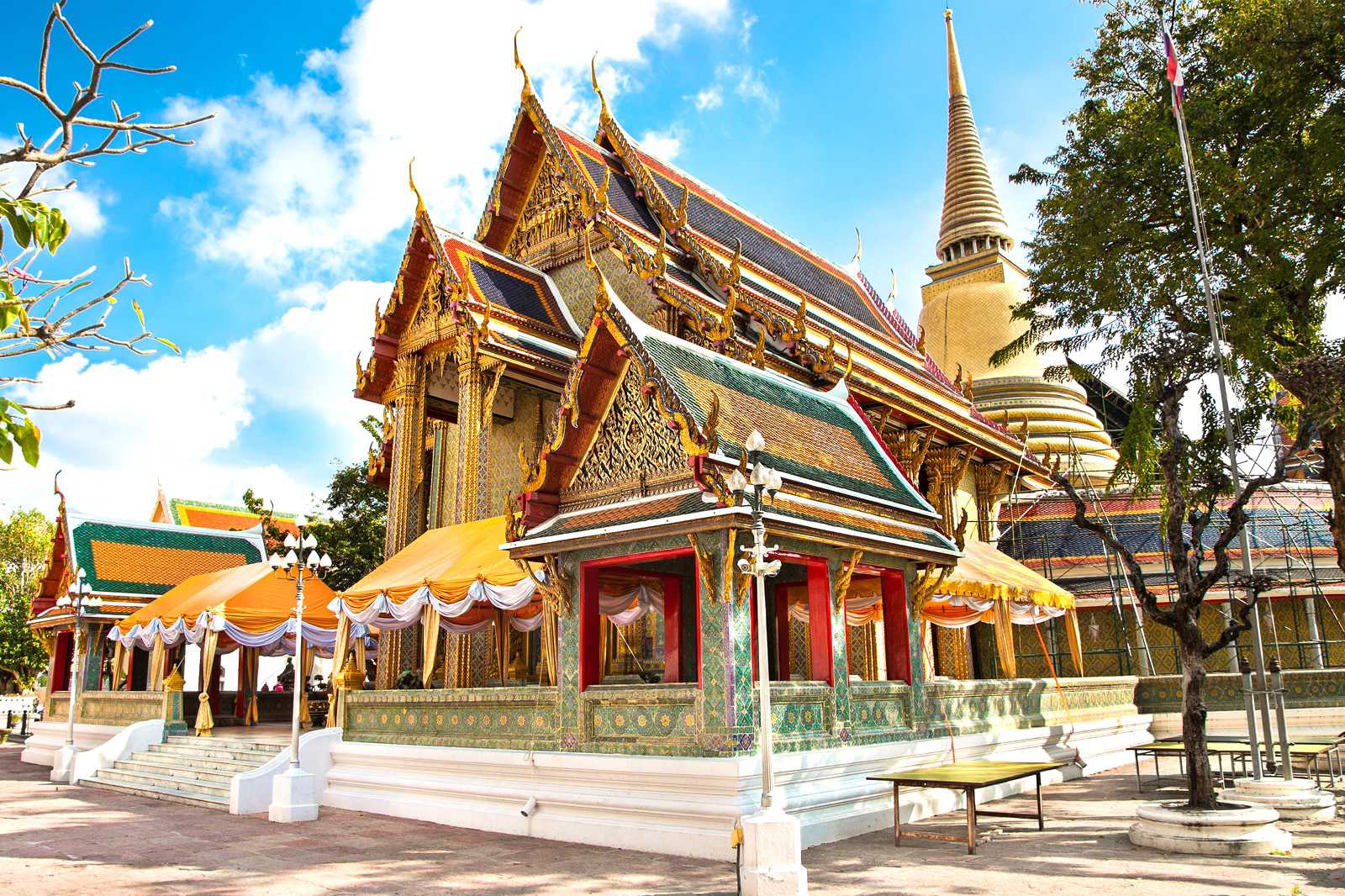
- Lavt budget
- Historie
- Billeder
Both the wiharn (prayer hall) and ubosot (ordination hall) in Wat Ratchabophit have typically Thai exteriors. The temple buildings are decorated in hand-painted glazed Thai-style ceramics and elaborate, gilded door and window frames, but with European-style interiors similar to that of a gothic cathedral.
The temple contains a well-known gilded Buddha image in the meditation posture, Phra Buddha Ankhiros, and rests on a base in which the ashes of King Rama VII are kept. An impressive chedi, modelled after the famous Phra Pathom Chedi in Nakhon Pathom province, contains relics of Lord Buddha, while the enclosure around it contains many Buddha images in various postures. There's also a royal cemetery with monuments containing the ashes of the Queen, concubines, sons and daughters of King Rama V, and various other members of the Royal Family.
Adresse: 2 Fuang Nakhon Road Phranakhon, Bangkok 10200, Thailand
Åbningstider: Daily from 6 am to 6 pm
Telefon: +66 (0)2 222 3930
Kort - 18
Wat Ratchapradit
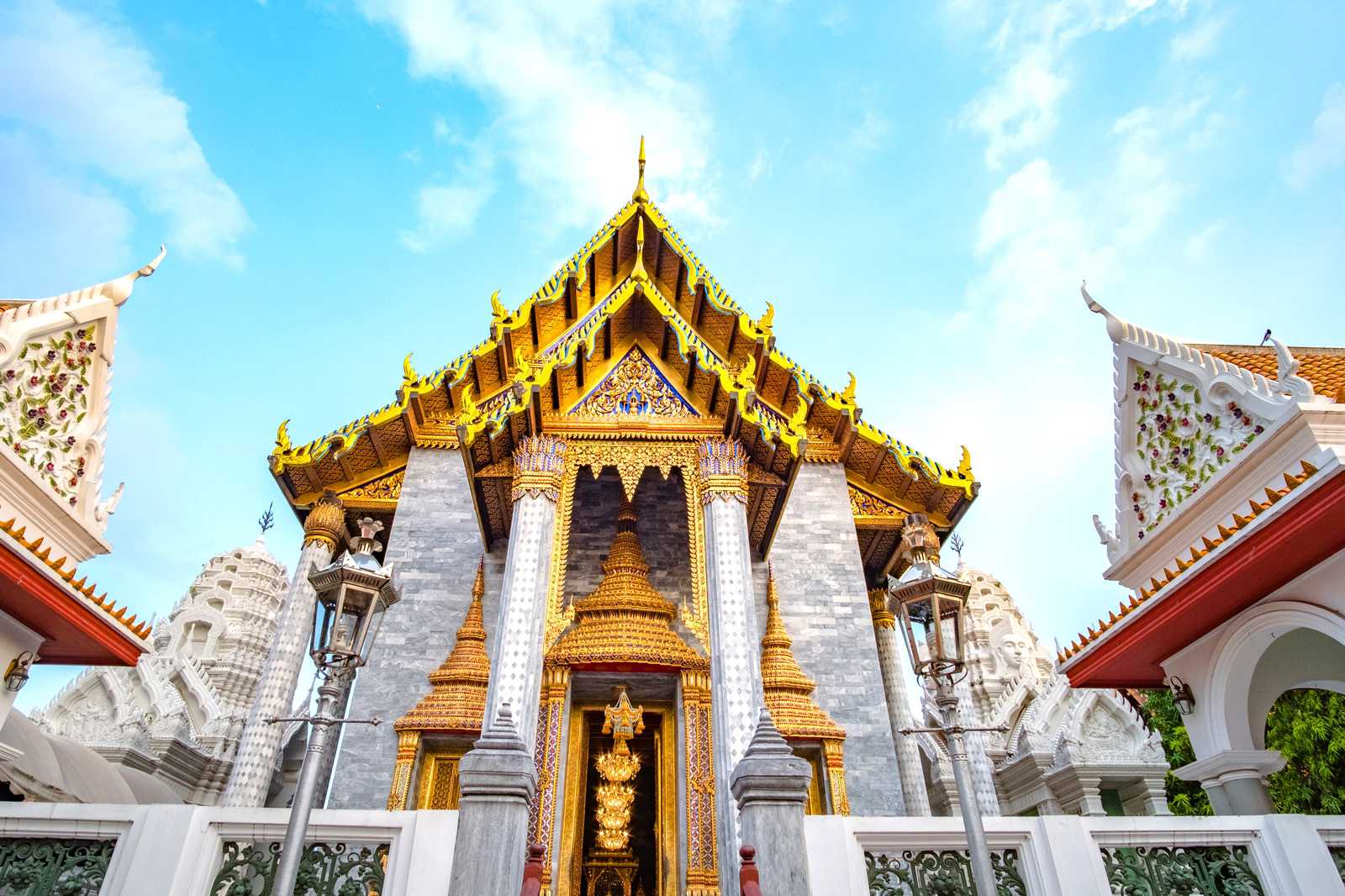
- Lavt budget
- Historie
- Billeder
Located in Rattanakosin, not far from the Grand Palace, the diminutive and yet striking Wat Ratchapradit dates back to the late-19th century and belongs to the Thammayut Nikai Buddhist sect. King Rama IV had it built on a former coffee plantation.
The central feature is a richly decorated prayer room in grey and white marble tiles and carved wood. The gateways and windows are adorned with intricate stucco crowns, the doors and window frames with Chinese pearl. The ceiling of the room is a deep red with patterns of golden rosettes, while murals of royal ceremonies grace the walls. Inside is a beautiful altar containing the ashes of King Rama IV, on top of which is a replica of Phra Buddha Sihing. There are also 2 Khmer-influenced prangs (towers), one of which has faces clearly reminiscent of Cambodia's Angkor Thom temple.
Adresse: 2 Saranrom Road, Phra Borom Maha Ratchawang, Phra Nakhon, Bangkok 10200, Thailand
Åbningstider: Daily from 8 am to 6 pm
Telefon: +66 (0)2 622 2076
Kort - 19
Wat Suwannaram
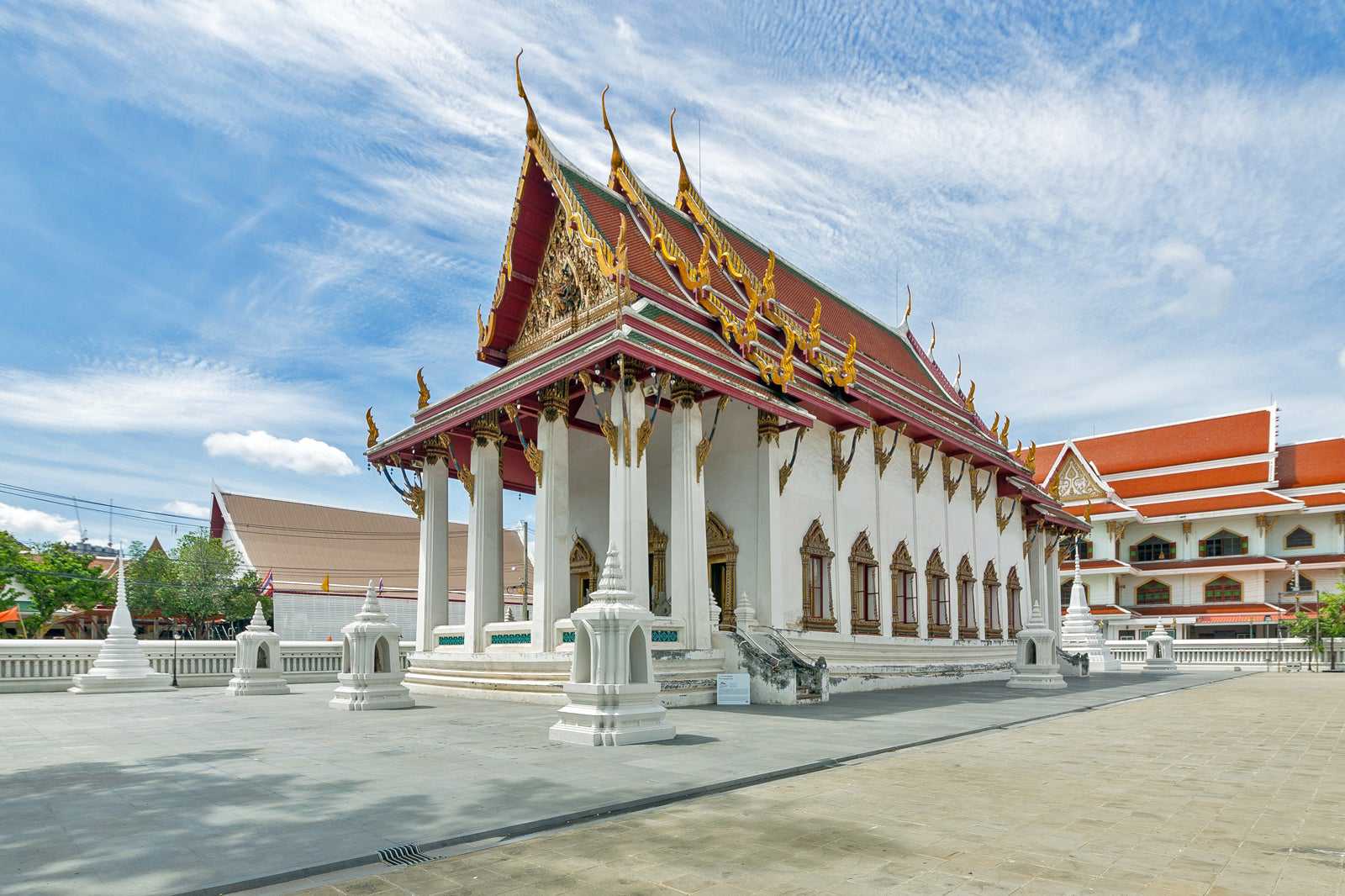
- Lavt budget
- Historie
- Billeder
Known for its wonderful original murals, Wat Suwannaram is a little-known and rarely-visited temple in Thonburi, not far from the Royal Barges Museum. It was built during the reign of King Taksin, during the Ayutthaya period, and briefly became an execution site for Burmese prisoners. Separate restorations during both King Rama I's and King Rama III's reigns gave it its current name and design, and it went on to serve as the Royal cremation ground for members of the royal family and high-ranking officers until the reign of King Rama V.
The temple's real draw is the collection of original, early-19th-century murals by famous historic artists Thong Yu and Pae Khong, which although decaying and in need of restoration, are exquisite. They tell the story of Lord Buddha and are considered by experts to be among Thailand's most beautiful. There's also a Buddha image from the Sukothai period. Other features in the temple complex include a wihan, or prayer hall, built during King Rama V's reign.
Adresse: 33 Charan Sanit Wong Road Soi 32, Siri Rat Subdistrict, Bangkok Noi District, Bangkok 10700, Thailand
Åbningstider: Daily from 8 am to 5 pm
KortBillede taget af Supanut Arunoprayote (CC BY 4.0) Redigeret
- 20
Wat Thepthidaram
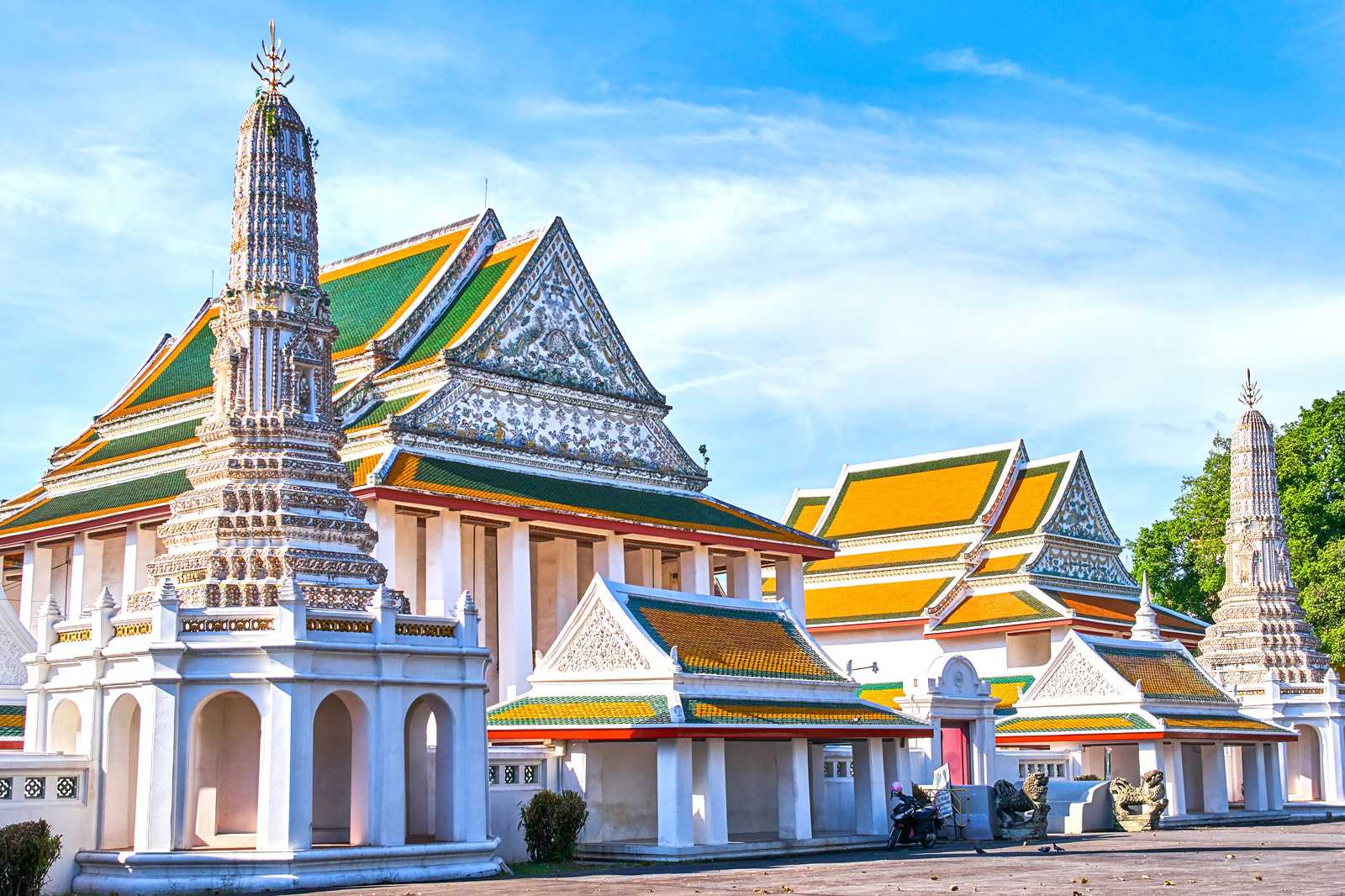
- Lavt budget
- Historie
- Billeder
Originally called Wat Ban Phraakrai Suanluang, this temple was built between 1836 and 1839 by order of King Rama III. A gift for HRH Prince Apsornsudathep, its architecture is characteristic of the period, especially the ordination hall, with its strong Chinese features such as a gable decorated with glazed ceramics. Inside are some impressive murals and the temple's main Buddha image, Luang Phor Khao or Phra Buddha Devavilasa.
The prayer hall exhibits a similar style and contains images of 43 enlightened female disciples cast in metal. There are also 4 tall prangs (Khmer-style towers) representing the 4 Chinese deities.
Adresse: 70 Maha Chai Rd, Samran Rat, Phra Nakhon, Bangkok 10200, Thailand
Åbningstider: Daily from 8 am to 5 pm
Kort - 21
Sri Maha Mariamman Temple
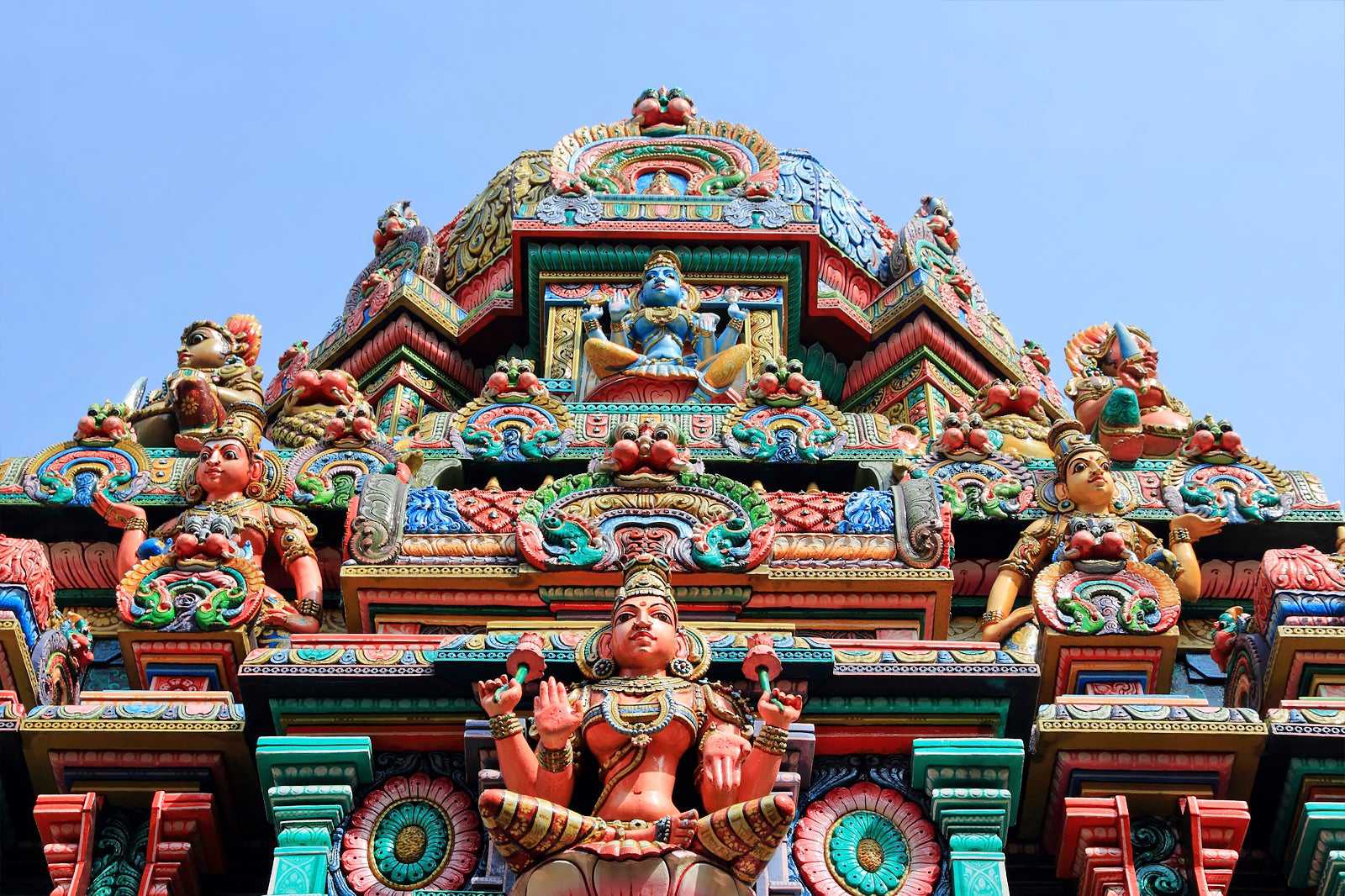
- Historie
Sri Maha Mariamman Temple is a Hindu temple dedicated to the Goddess Mariamman. It was built by Tamil immigrants in the 1860s, featuring a riotous blend of rich colours and ornate decoration that makes for rather unexpected sight in Silom. It’s a great site for a little taste of Indian architecture right in the heart of Bangkok.
The tall central structure is plastered full of detailed, entwining Hindu deities. The shrines inside the temple are dedicated to both Shiva's consort and the elephant-headed Ganesha, with others paying homage to Vishnu and Krishna.
Adresse: 2 Pan Rd, Silom, Bang Rak, Bangkok 10500, Thailand
Telefon: +66 (0)2 238 4007
Kort - 22
Wat Mangkon Kamalawat
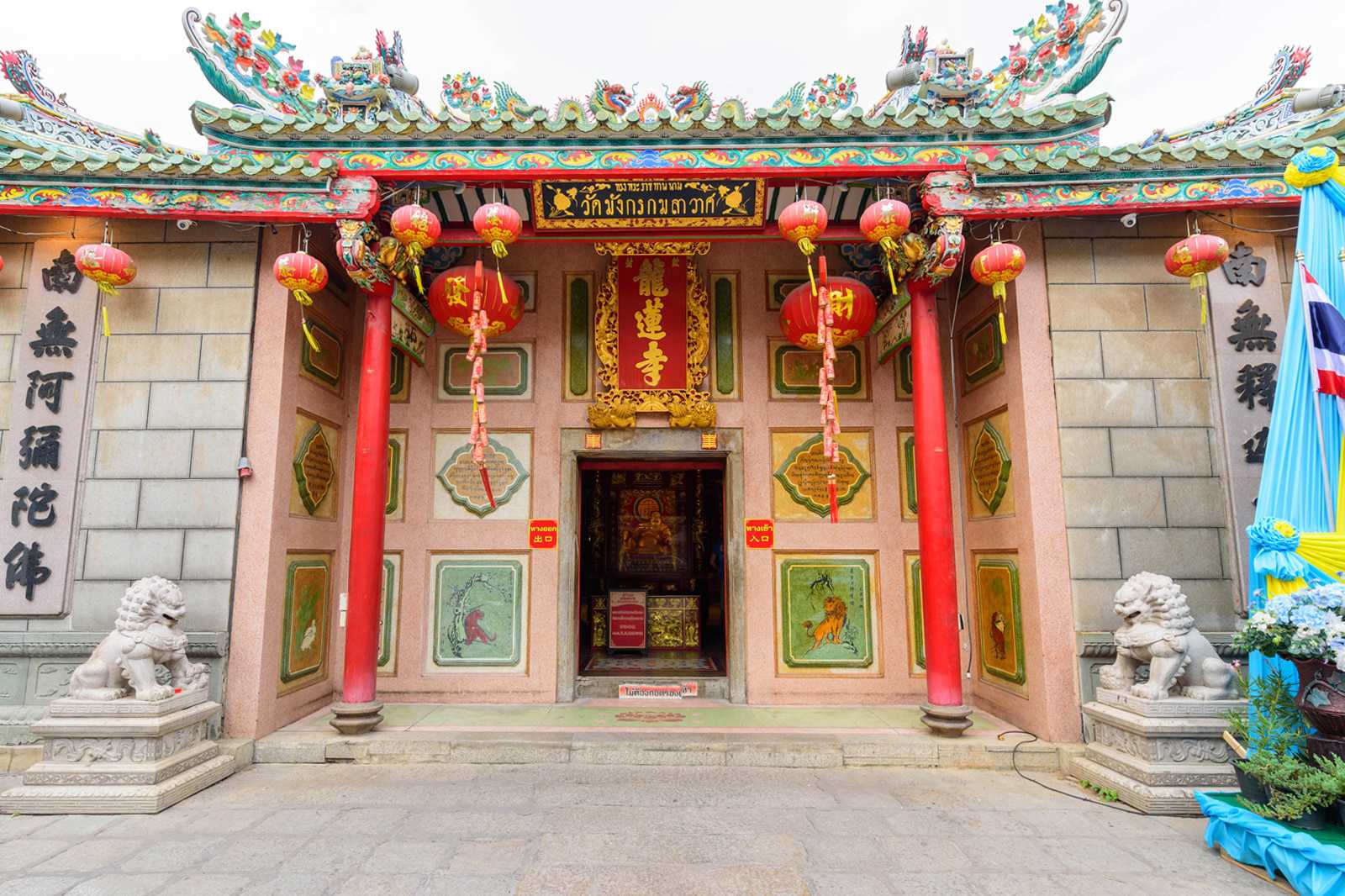
- Historie
- Billeder
Wat Mangkon Kamalawat, also known as Wat Leng Noei Yi, is a temple that’s nestled in the heart of Chinatown. The temple is the hub of activities during festivals like Chinese New Year. It’s often referred to as one of Bangkok's most important and largest Chinese-Buddhist temples.
The temple contains spectacular Buddhist, Taoist and Confucian shrines and dates back to 1872 when it was called Wat Leng Nui Yee. King Rama V then changed its name to Wat Mangkon Kamalawat (which means Dragon Lotus Temple).
Adresse: 423 Charoen Krung Rd, Pom Prap, Pom Prap Sattru Phai, Bangkok 10100, Thailand
Åbningstider: Daily from 9 am to 5 pm
Telefon: +66 (0)2 222 3975
Kort - 23
Gurudwara Sri Guru Singh Sabha Temple
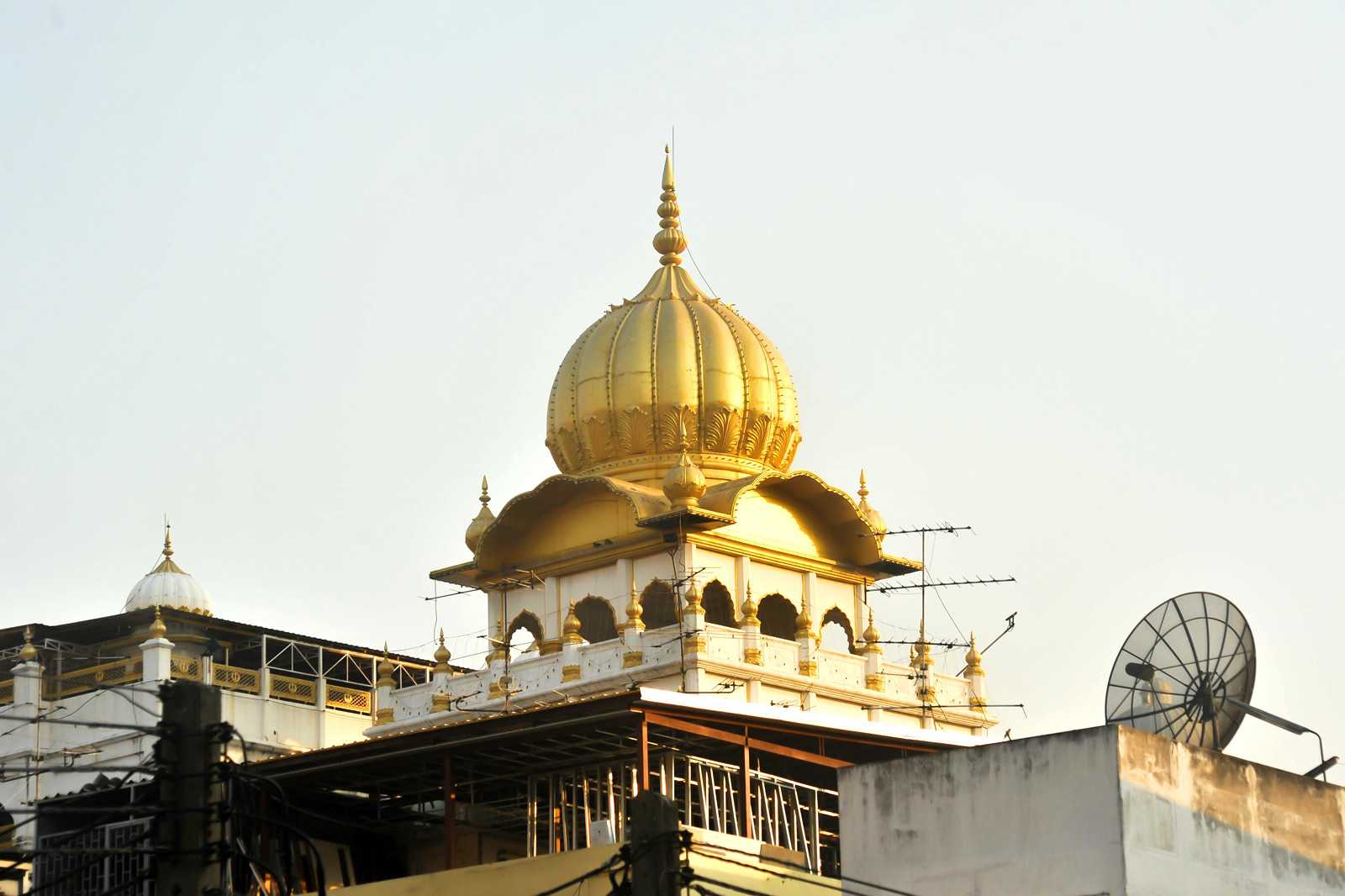
- Historie
- Billeder
Gurudwara Sri Guru Singh Sabha is a Sikh temple in Pahurat, on the edge of Chinatown. This area is the heart of Bangkok's small but lively Sikh community. The white, 6-storey temple is topped with a golden dome. It was built in 1932 and is the second largest of its kind outside India.
You’ll find the congregation hall on the 4th floor, and an international school on the 5th floor of Gurudwara Sri Guru Singh Sabha Temple. The top floor is the main prayer area, with a copy of Sikhism's holy book, Sri Guru Granth Sahib, interned on a flower-filled altar.
Adresse: 571 Chakkraphet Rd, Wang Burapha Phirom, Phra Nakhon, Bangkok 10200, Thailand
Åbningstider: Daily from 10 am to 6 pm
Telefon: +66 (0)2 221 1011
Kort - 24
Wat Pathum Khongkha
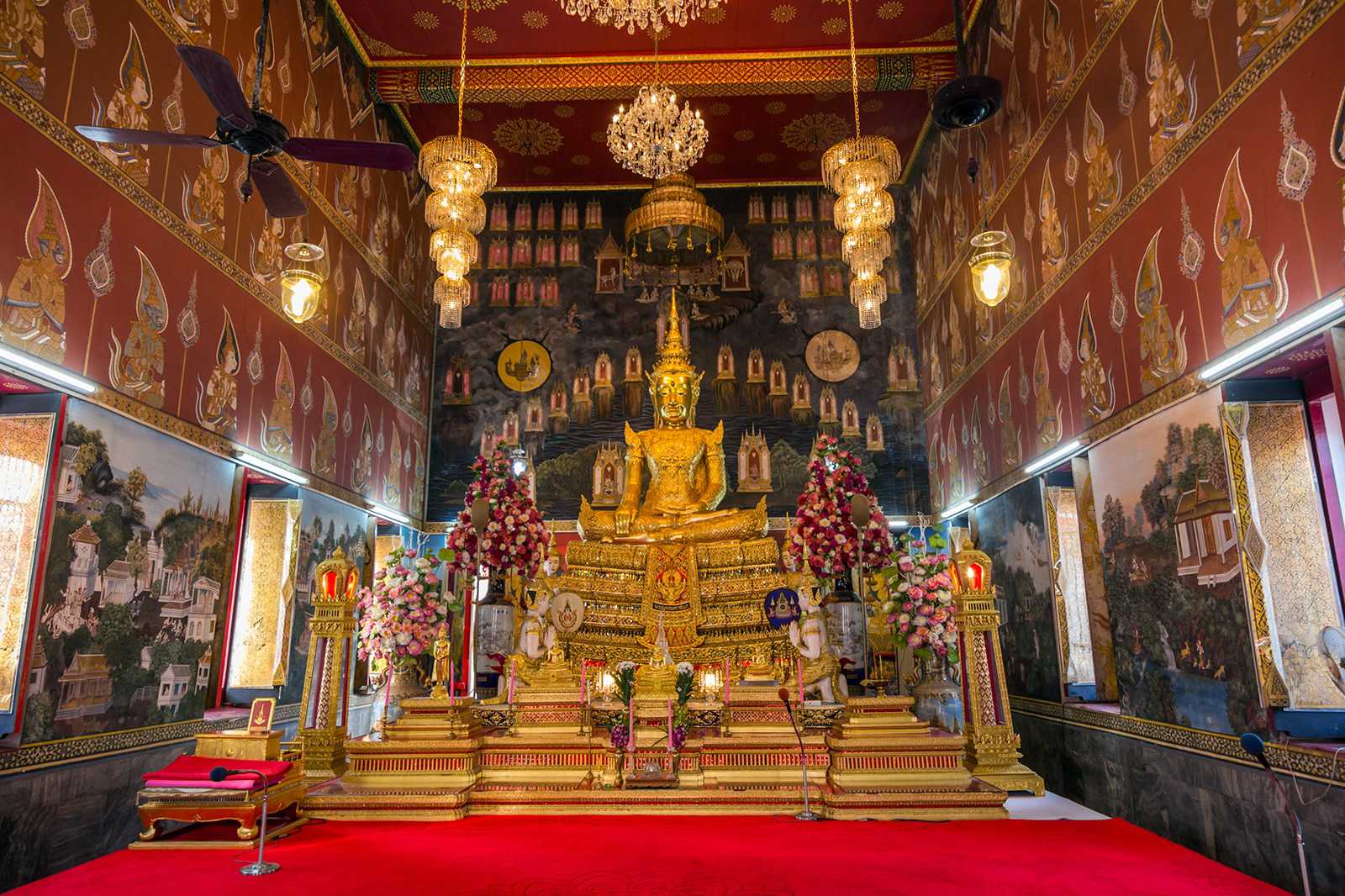
- Lavt budget
- Historie
- Billeder
Chinatown's Wat Pathum Khongkha is a pretty temple dating back to the Ayutthaya period, but once served an extraordinary, rather grisly purpose. It was used as an execution site for members of the Royal Family in the early Rattanakosin period. Several members from the first and third reigns were disposed of on the temple's execution stone.
Adresse: 1620 Song Wat Rd, Samphanthawong, Bangkok 10100, Thailand
Åbningstider: Daily from 5 am to 9 pm
Telefon: +66 (0)2 639 1952
Kort
